#in the context of a show written about the 80s in not the 80s
Explore tagged Tumblr posts
Note
Rlly curious if you’re willing to elaborate on your tags in that senseless post!
omg of course. perfacing by saying im not. a huge movie buff so this is more of a theoretical thesis that could easily change if i watch any film made past like 1987. but. in my experience metalheads aren't protagonists in the same way punks are. rarely are they main characters at all- the exception being rocksplotation horror movies which, the ones i have watched are very tongue and cheek and are made mostly with the audience of metalheads in mind. imo. or there's fakeumentaries like spinal tap which also are unserious but still like. metalheads love that shit the jokes are funnier when you are In On It. and then ig bill and tedd are metalheads?? ive never seen it. and waynes world. but that's the thing they aren't All Dressed Up in The Outfit it's a secondary part of their loserdom or stonerisms, it's not representative of anything on particular its just a detail which allows for headbanging car scenes and dialogue name drops.
punks, on the other hand. are a very visually arresting subculture at the same time they have lot of thematic possibility so you see punks as significant characters more, dressed up a lot more, in my experience. the whole nine yards with piercings and the vests and shit. and that archetype is filled with potential- they're a vehicle for disillusionment by older counterculture writers to discuss the disingenuous nature of suburban punks and their fake, childish radicalism, they're a tool for bitter old directors to hold up a deterioration of society, they're truth tellers, they're wastoids, they're hot, they're dangerous- they can represent a lot and you don't have to be invested in punk to utilize that archetype ripe for exploring. metalheads just don't have the same potency, unless you factor in the devil
in the end this is mostly negative, you don't see a lot of incredibly human portrayals of punks. and for as cheesy as metalhead horror fests are, they are attempting a kind of realism for being a outcast loser the average nonrockstar was i can respect. idk it's an interesting dichotomy! and makes me think i need to watch more shit short films.
#unfortunately this is why eddie stranger things as a Phenomenon fascinates me soooo deeply#very senseless style subculture signaling you dont see much. and it makes sense bc the archtype eddie represented had actual weightc#in the context of a show written about the 80s in not the 80s
3 notes
·
View notes
Text
no offense but i think when critiquing jay’s (and let’s be real all of the OG four ninja’s) behavior in the pilots and early seasons, a lot of people ignore that the cultural context and attitude about misogyny and especially misogyny in children’s media is VERY different today than it was in the late 2000s/early 2010s
#not saying it’s great but lots of the shit early seasons jay gets flack for was standard for male protags. ESPECIALLY if part of the plot#was *them unlearning it*. yknow. what they were trying to show with the resolution of the sam x arc#i’m not saying they did it really well but the cultural attitudes in the US about gender have VASTLY changed since 2011#like when the netflix show cut sokka’s misogynistic jokes everyone was upset that they were taking away a character growth moment .#not saying ninjago has equivalent writing quality *but* those storylines come from the same cultural narrative that was prevalent at the ti#time. guy character flirts with girl -> doubts her abilities -> doesn’t believe she is actually as skilled when she gets her overblown#Girlboss Moment -> awkward reconciliation bc all these plots were written by middle ages men who haven’t been teenagers since the 80s#text✨#ninjago#ninjago was very firmly a boy’s show. it had consequences. and like… just in general you gotta take the context that story choices were#made in into account#okay thanks for reading the ramble 👍 jay rose early seasons enjoyer (with caveats) strikes again#i’m running on four hrs of sleep before a long work day gurantee i’ll reread this in 12 hrs and find seven mistakes
20 notes
·
View notes
Text
Love when i look something up and find a fucked up wikipedia entry about it
#looked up patalliro#wtf is even that#what happens in that show#saw someone reblog a pic of it and it's artstyle looked cute so i thought i'd read about it.#i was amused closed the article and opened it back up just to get more context#personal theo tag#there was a lot i expected to find looking up old 70/80's manga and animr#mpreg was not one of them#it's not even explained like#genuinly about to burst into tears#i feel like it is kinda anti lgbtq or at least very fetisy about it#if not i would be halfway thru the fiest season by now#update: i watched one of the stage plays#can't believe that the gay couple is the most normally written part in all of this like genuinly a pretty enjoyable romance all around huh
5 notes
·
View notes
Text
some important calvin and hobbes facts in case you haven't read the original comic strip in a long time or only absorbed stuff on it from memes and out of context bits on here:
Calvin's last name has never been given, and neither has any of his parent's names. This was actually why his uncle Max only showed up for a brief storyline; the creator of the comic, Bill Watterson, ultimately felt that while it was fine to have him as someone for his parents to talk to, it felt far too awkward to never have Max refer to them by name and he never made a return appearance.
The general tone of the comic is fairly light-hearted, with a big emphasis on goofy slapstick comedy contrasted by clever wordplay and often surprising adult-centered jokes that'll hit you like a slap. A big part of the comedy is, as Watterson put it (paraphrased) "It's really funny to me when people express deeply stupid ideas with really fancy terminology." One notable example you might have seen is that one bit where Calvin asks his mom for money to buy a Satan-worshiping rock album and his mom replies that there's nothing genuine about them and they're just putting on the attitude for shock value, and comisserates with Calvin as he deplores that mainstream nihilism can't be trusted. He concludes that childhood is disillusioning.
There is a LOT of criticism of the extreme materialism and selfish mentality of the late 80s, when the comic was initially written. This may go a long way to explain how its aged so well; much of what it criticizes resonates well with people today.
Bill Watterson views comic strips a legitimate form of artwork, and repeatedly fought to have more space to draw more beautiful and artistic backgrounds, which was a very hard fight and unpopular even with other comic strip artists. He eventually did win some compromises and a lot of Calvin And Hobbes' artwork shows it, with the use of space to indicate time as well as a sharp contrast between the often plain environments of mundane life contrasted by the wildly beautiful imagery of Calvin's imagination (which often sports realistic depictions in an art shift of sorts).
Hobbes is explicitly not an imaginary friend, by word of Watterson himself. We don't know WHAT he is exactly, and Hobbes is apparently unaware of the strange nature of his reality; people look at him and only see an ordinary stuffed tiger plushie, but he has a tangible effect on the world that would be physically impossible for Calvin to do on his own. He's apparently been around for a while, and was apparently around when Calvin was a young baby.
On that note; Hobbes has implicitly killed (notably treated as both a gag and also with the vibe of 'he's a tiger, duh') and while he doesn't do it again on-screen, he doesn't have any moral issues about it. Calvin claims that he's never had trouble bringing Hobbes to school because the last time he did, Hobbes killed and ate a bully named Tommy Chestnut and simply comments that it was gross and he needed a bath. Calvin's tried to repeat this again, but Hobbes was grossed out at the thought having to eat a kid raw and not being allowed to use an oven first, or complaining that children are too fattening.
Hobbes became gradually less human-like in body language and more like an actual cat in both body language and behavior; this was due to Watterson drawing more inspiration from his cat, who also inspired a lot of Hobbes' running gags, such as pouncing on Calvin when he got home. Several years into the syndication of the strip, Watterson's cat passed away, and he did a tribute to her with a comic strip of the two of them agreeing to try to dream together so they can keep playing when they have to sleep; Watterson's commentary (if I recall right), remarks on his cat: "We can see each other again in dreams."
46K notes
·
View notes
Text
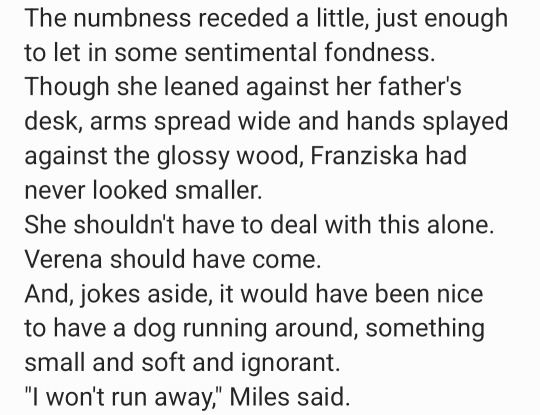
And if I told you I finally came up with a fucking framing device for my Twinkfred von Karma origin story series thing
#it's really crazy how things can influence you without you ever realizing like. i was really into Kung Fu Panda after it first came out#like REALLY into Kung Fu Panda#2008??? damn i would have been like 11/12#anyway i read this fic called Memoirs of a Master written by someone obviously a lot older and smarter than me and i just loved it#it was about Tigress and Po discovering Shifu's diaries (he was on a trip i think)#and so that was the framing device like it was Tigress and Po kinda guiltily reading this diary and learning about Tai Lung and all that#and i read a LOT of Kung Fu Panda fic so it wasnt like this one was particularly special to me *at the time*#(again i was like 12 i just liked anything that made my brain go brrrr. i read a lot of fic about rhe cast of KFP getting magically#transported into the KFP universe like i wasnt a literature connoisseur by any means)#but over the years i just never stopped thinking about Memoirs of a Master#and this isnt even the same framing device it's just similar but i cant even describe to you how much of this fic simply *is*#Memoirs of a Master#like obviously it's not. you could read that and then read this once i finish and notice maybe loke 3 superficial similarities#but at the same this fic would simply not exist without it#not to quote kamala harris of all people but you really do exist in the context of all that came before you#anyway.#the warped maniacal mind of wizard glick at work#oh yes also idk other ppl's hesdcanons for the other von karma daughter but i went with Verena because#1) i thought it was pretty#2) it means 'truth' or 'verity'#3) it doesnt make sense with the surname— 'truth from karma' is meaningless and i have her as kind of distant from the family#4) it showed up on random list of 'german names that were popular in the 80s' i found. didnt bother to do the math or even pick an age#for her but it really doesnt matter#okay. i think that's all.
0 notes
Note
What moment in ttte made you shocked?
Idk man ttte isn't a very shocking show. It's incredibly down to earth, if a bit real with some of its stories. While yes some of the earlier episodes and especially the books can branch onto more serious and arguably darker content its nothing that would really shock me per se.
Nothing really shocks me, it just makes me think. Maybe be a bit sad or feel for the characters. But that's what any good story does.
#idk really know what you want me to say here#im not super into talking about the quote on quote darker elements of ttte. i like my fluff#people act like its this secretly dark and fucked up kids show. shocking people. constantly bringing up Henry’s tunnel and what not#and they dont take into account not only rhe full context. but the messages themes and time period that the stories were written.#these “darker” storylines were written in the 40s. where a punishment like this would seem normal.#obviously now in 2023 these views have changed#its like the old children's parlor game Snapdragon. played in 1800s.#where children would eat raisins out of a burning dish of brandy while it was still on fire#times change and its important to take the context into consideration. does it make the action or plot point any less unsettling? no.#like i said perceptions have changed. but i dont think its fair to call it a fucked up oooo dark and egdy not what you think show#dont act like it was written in today's time when it wasnt. the authors didnt write that show for Children's television in the 80s to shock-#-and scare kids. it was written in 1945 by Awdry as an allegory for being a brat. you get put on the naughty step or go to your room#like how henry was shut in thr tunnel. granted today the wording and time spent in the tunnel seems overly harsh. which it is.#but it also might be hyperbole. also henry was let out the very next story and everyone fucking misses that fact and i fucking hate it#HE WAS LET OUT OF THR TUNNEL THE VERY NEXT EPISODE#sorry sorry i went on a bit of a rant in the tags. anyways nothing in ttte shocks me cause theres nothing really shocking about it#red answers
1 note
·
View note
Text

So why did Transformers One bomb?
Look, I'm just going to say it right off the bat: no, Transformers One is not the best Transformers movie of all time. I am (gritting my teeth) very happy for every single Transformers fan except me, who all seem to have liked it, and most of whom seem to have loved it. I agree that, as a production, it meets some baseline level of technical competence. It's a perfectly fine movie.
It's also the worst-performing Transformers movie Paramount has ever made.
Hopefully, now that its theatrical run has unceremoniously ended, people aren't going to try to rip me to shreds for theoretically threatening this multi-million-dollar film's box office revenue some miniscule amount by sharing a few teensy weensy complaints with my fifty followers.
Because I do just have a few little nitpicks, which I've tried my best to communicate, over the next 17,000 words of this post.
If you're not a Transformers fan, sorry, this essay is mostly written with the assumption that you've seen Transformers One. However, it might still be of some interest as a window into the current state of the franchise. I've written a basic plot summary of the movie to bring you up to speed, in that case. Because Transformers One purports to be the perfect introduction to the story, no homework needed, I've also done you the courtesy of elucidating background context as needed—think of this less as a review, and more as a history lesson, or maybe a "lore explained" YouTube video. After all, that's pretty much all that Transformers One is.
(And if farcically long posts aren't really your thing, you might prefer to listen to the special episode of Our Worlds are in Danger where my pals and I chatted about the film. Many of the hottest takes and silliest bits in this essay are shamelessly stolen from Jo and Umar.)
We've been waiting for Transformers One for a very long time. It's the first animated Transformers film to get a theatrical release since The Transformers: The Movie came out in 1986. It first entered development around a decade ago. Many fandom members I know online got to see it as far back as June. Its US premiere was in September; those of us in the UK had to wait a full extra month before seeing it, for no clear reason. This is a film which purports to show, in broad strokes, for the first time on the big screen, the origin of the Transformers: where they come from, who they are, and why they're fighting.
By the end of its runtime, Transformers One does not actually answer these questions. Don't get me wrong, it takes great pains trying to answer a lot of different, related questions—just ones which nobody was really asking in the first place: What does the word "Autobots" mean, if not "automobile robots"? What does the word "Decepticons" mean, if they're not actually deceitful? Why is he called "Optimus Prime"? Why is he called "Megatron"? If they were friends, why did they fall out? Why does Starscream sound Like That? Where does Energon come from? If "Prime" is a title, what were the other Primes like? How do Transformers transform?
Writer Eric Pearson, coming onto the project as an outsider to Transformers, describes having to go to Hasbro to ask these kinds of questions:
they had a script that outlined the story that they wanted to tell. I knew Optimus Prime and Megatron and I knew Bumblebee as well, or B. I had to ask about some of the other deeper ones, the mythology, “what exactly is the Matrix of Leadership?” Stuff like that.
See, Hasbro does in fact have the answers written down somewhere. The story as I understand it goes something like this. During the wild west of the '80s and '90s, Transformers "canon" was largely a by-the-seat-of-your-pants consensus-based affair between the freelance writers and copywriters the toy company would bring on to advertise their toys. That changed around the turn of the millennium, when late later-CEO Brian Goldner saw how Hasbro's licensed IP lines (such as Star Wars) were more financially successful and realised they could make more money by aggressively promoting their own in-house IP, which they didn't have to pay licensing fees for. (For the curious, a similar thought process at rival toy company Lego was what led to their creation of BIONICLE.)
The guy basically singlehandedly managing the Transformers brand at the time, Aaron Archer, eventually set to reconciling all the self-contradictory lore surrounding Transformers, an endeavour which dovetailed into the creation of the HasLab internal think-tank (best known for Battleship, the 2012 store-brand Michael Bay knockoff which was a failure critically and commercially but not in my heart) and ultimately the creation of the so-called "Binder of Revelation", an internal story bible which cost over $250,000 to produce and has strongly influenced nigh on every piece of Transformers media released since, but which we hadn't actually seen until it got leaked a week ago. As it turns out, the document itself (compiled mostly by marketers and toy designers) is patently useless to any writer: it's a typo-ridden internally-inconsistent wishy-washy mess that mostly describes the characters in terms of a made-up form of Transformers astrology that has otherwise never seen the light of day.
So although the Binder is the baseline story bible for most modern Transformers media, its influence isn't direct per se; it's more accurate to describe it as being an elaborate game of telephone between high-profile cartoons, comics, and other internal documents, with the Binder itself apparently just sitting in a drawer somewhere at Hasbro; Eric Pearson says that he never received a "binder", with the "script" he mentions either being the earlier draft from Andrew Barrer and Gabriel Ferrari (the guys who originally pitched the story), or some other unseen internal document. Director Josh Cooley, however, definitely seems to have been physically handed the Binder or its mass-market adaptation:
I knew that there was a lot of origin to be told, and when I first started, [Hasbro] gave me the Transformers Bible. I could not believe how big it was. I was like, "This is way more than I ever anticipated."
When trailers first dropped for Transformers One, a lot of my friends who are savvy were immediately like: "Oh, this is a weirdly faithful adaptation of the Binder of Revelation, huh."

I. The One True Origin of the Transformers
Half of the people reading this are Transformers fans, and half of you literally could not give less of a shit about Transformers, so if you're in the 'former group (so to speak), you'll just have to bear with me while I bring the rest of us up to speed.
Before the Transformers' civil war begins, Cybertron is being oppressed by the Quintessons. The Quintessons are a race of five-faced aliens (as in, not Transformers), who execute everyone they come across, first introduced in The Transformers: The Movie, presiding over a kangaroo court on a castaway world. In the followup cartoon five-parter "Five Faces of Darkness", writer Flint Dille established that, gasp, they were actually the original creators of the Transformers! But basically nobody else at the time was particularly compelled by this idea, it seems, with most fans preferring the more mythological origin story conceived by Bri'ish writer Simon Furman for the Marvel comics. I think people kind of just didn't like to think of the Transformers as being robots—mass-produced, a fabrication, programmed—as opposed to an alien race of thinking, feeling beings like us. But because the cartoon was important to many kids, a lot of early-2000s media tried to reconcile the cartoon and comic origin stories by stating that the Quintessons didn't actually create the Transformers; rather, they simply colonised the planet early in its history and pretended to be the Transformers' creators, until the truth came out and they got kicked offworld. This is how the Binder of Revelation ultimately paid lip service to the Quintessons. In Transformers One, the Quintessons are just sort of here, they're these evil aliens secretly skimming Energon from its miners, they don't speak English (or whichever language the film was dubbed into in your market region), they're just these nasty societal parasites.

Energon is Transformers fuel. In the original cartoon, it was these glowing pink cubes the Decepticons were always trying to produce using harebrained Saturday-morning-cartoon energy-stealing devices. There was a Cold War going on, America had just been through an "energy crisis", maybe you're old enough to remember any of that. Transformers are these big, complicated machines, so I guess the idea is they need this hyper-compressed superfuel to run off, and their homeworld has run out. By the time of the Binder of Revelation, the concept had been telephoned to the point where Energon is like the lifeblood of Primus or some shit.

Primus is the Transformers God—but not the kind of God you have "faith" in, rather this actual guy whose existence is objectively known in various ways. He transforms into a planet, that's kind of cool, right? Where does Primus come from? Look, it doesn't matter, he's like, the God of Creation, he was there at the start of time. He created all of the Transformers. All the other species in the galaxy, though, they evolved naturally thanks to "science". Actually wait, didn't that Quintus Prime guy go around the universe seeding all the planets with different kinds of Cybertronian life? That's why they're called Quintessons. See, now you know. Who's Quintus Prime?
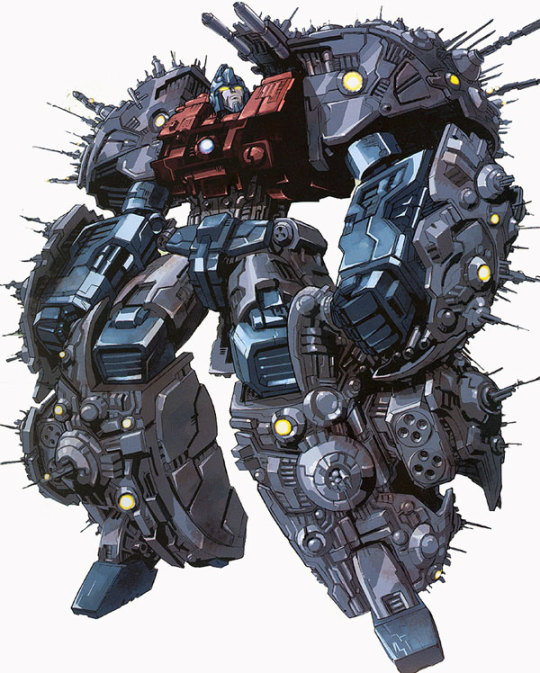
Okay, so the Thirteen Original Transformers, or the Primes, are the thirteen original Transformers created by Primus. Most of them correspond to different kinds of Transformer: Nexus Prime is the god of Transformers who can combine, Onyx Prime is the god of Transformers who turn into animals, Micronus Prime is the god of Transformers who are small, and Solus Prime is the god of Transformers who are women. You might remember the Primes from Revenge of the Fallen, although there were only seven of them there for whatever reason.
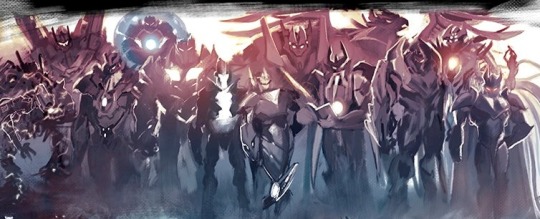
Honestly, The Fallen was the only one who mattered for a long time. The whole reason there's thirteen of them is because thirteen is kind of an unlucky number, right? Twelve would've been fine. But throw in a thirteenth guy, and he betrays everyone, he's this fucked up evil guy. In the Binder of Revelation, though, the Thirteenth Prime is his own special guy shrouded in mystery, because they kind of liked the idea that Optimus Prime would secretly turn out to have been the Thirteenth Prime all along, and he just forgot or something, because that means he has the divine right of Primes. In IDW's 2010s comic-book reboot, the Thirteenth Prime was called "The Arisen"—in reference to that one line in The Transformers: The Movie, "Arise, Rodimus Prime!" (this margin is too narrow to explain who Rodimus Prime is). Towards the end of his run, writer John Barber did some actually interesting stuff with the concept, playing with the ambiguity over whether-or-not Optimus Prime was actually the chosen one.
All of Optimus Prime's immediate predecessors as Autobot leaders, Sentinel Prime, Zeta Prime, the lineage seen in "Five Faces of Darkness"... they're all false Primes. They're Primes in name only. In fact, IDW had a whole procession of these cartoonishly evil dictators thanks to a few continuity errors leading to the addition of a couple of extra narratively-redundant fuckers. Transformers One tries to simplify it slightly by just saying that Zeta Prime was one of the Primes for real—occupying that thirteenth "free space"—and it was just Sentinel Prime who was only a normal Transformer pretending to be a Prime, then Optimus Prime who's a real boy.
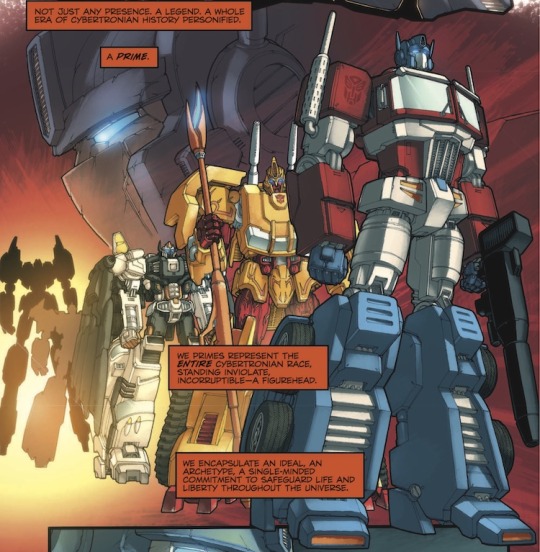
But if he's not a Prime from the start, Optimus Prime needs another name in the meantime. In the '80s cartoon episode "War Dawn", before he was called Optimus Prime, he was called "Orion Pax". Have you noticed that Optimus Prime is kind of an odd-one-out amongst all the straightup-English-word names like "Bumblebee" and "Ratchet" and "Jazz"? That's because his name was one of a tiny handful from very early in the franchise's development, before writer Bob Budiansky came onboard and came up with identities for the vast majority of the toys. Practically everyone Bob Budiansky named is called like, "Bolts" or some shit, long before the characters even know of Earth, which has always just been a contrivance of the setting you're not supposed to think about.
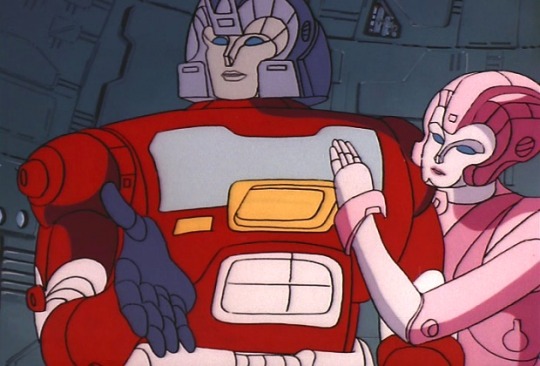
Presumably to create a parallel with Orion Pax's transformation into Optimus Prime, someone at Hasbro in the 2010s came up with a new name for the bot who would become Megatron: "D-16". In real-world terms, this was nothing more than a dorky reference to the Megatron toy's original Japanese release being number 16 in the line ("D" stands for "Destron", which is what they call Decepticons in Japan). But in-universe, the name "D-16" was drawn from the sector of the mine where he worked. I don't get the impression it was originally intended to be part of a broader pattern.
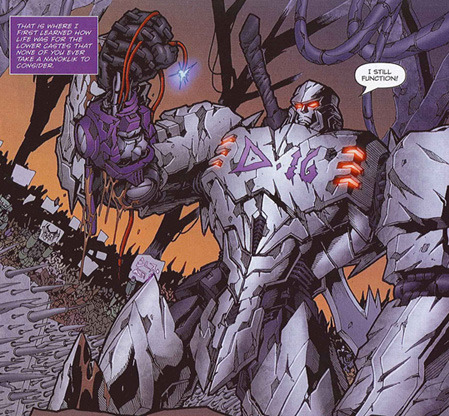
Which is why I'm baffled as to what the hell the reasoning was behind Bumblebee's pre-Earth name, "B-127". There's this bizarre situation in the Bumblebee film, where the name "B-127" first cropped up, where literally every other bot gets a normal cool name with personality like "Cliffjumper" or "Dropkick" except for Bumblebee, who is stuck with this clunky sci-fi name until he makes friends with a human teenager on Earth and she gives him the name Bumblebee. I guess I don't find it confusing that the writers would (correctly) realise it's a bit weird for Bumblebee to be called Bumblebee on an alien planet where bumblebees don't exist. What I find confusing is that they didn't extend that logic to any other character.
So despite everything else in the franchise's direction pointing away from "robot" and towards "alien", Transformers One ends up with this ridiculous situation where two of the most important guys are, for practically the whole movie, simply referred to as "Dee" and "Bee", I guess because the writers correctly realised the numbers sound fucking stupid.
And if you squint, "Elita-1" sorta fits this naming scheme. But the great irony of it is that the very same cartoon episode which coined "Orion Pax" simultaneously established that Elita-1 also used to go by a different name: "Ariel"! Like the Little Mermaid. Y'know, because an "aerial" is a type of electrical component- oh, forget it.
By the time the script made it into Eric Pearson's hands, it's obvious that he simply was not thinking about it that deeply. He describes the genesis of a scene where Bumblebee introduces his imaginary friends, "A-atron, EP 5-0-8, and Steve." A-atron was impov'd by Keegan-Michael Key as a reference to one of his own skits on Key & Peele. Steve ("He's foreign.") was literally just because Pearson thought it would be funny. It's true that Steve is an inherently funny name, and I guess if you're struggling to come up with jokes of your own, it can be handy to fall back on something which is inherently funny.

And again, our silly answers to these silly questions beget yet more questions. If he started out as "D-16", then where did the name "Megatron" come from? And if all the Primes have epic made-up fantasy names, then surely that one guy can't just be called "The Fallen", right? That's not a name, that's an epithet. Unfortunately, someone at Hasbro had the bright idea to answer both these questions at once: The Fallen's real name was "Megatronus". Later, for consistency, they threw on the title, and we get "Megatronus Prime", which sounds like what a thirteen-year-old on deviantART in 2014 would call their Steven Universe fusion of Megatron and Optimus Prime. So you see, Megatron actually named himself after Megatronus Prime, famously the most evil of the Primes. In Transformers One, this is changed slightly so Megatronus is merely the strongest of the Primes, as part of its overall effort to make Megatron not look completely insane.
Which, it must be said, is a tall order. Better stories have tried and failed. Back in 2007, Scottish writer Eric Holmes came up with Megatron Origin, a perfectly-fine comic miniseries which drew heavily from the miners' strikes that took place in the UK from 1984-1985, coinciding with the inception of the Transformers franchise. In that comic, Megatron is a lowly miner who, through a series of chance events, winds up at the head of a dangerous political revolutionary movement.
For some reason—I guess because nobody had ever tried to make Megatron anything other than a bloodthirsty cackling madman before—this take on Megatron as a guy who rose up against a corrupt system became the defining interpretation of the character, copy/pasted pretty much wholesale into the Binder of Revelation. Orion Pax also opposes the system, and bonds with Megatron over it, but they disagree on how to fix it: Pax believes in peaceful reform, Megatron just loves to kill. In Transformers One, the problem everyone has with Megatron is basically "whoa, this guy's a little TOO angry!" and there's a point towards the end of the film where Megatron suddenly starts jonesing to kill literally anyone who stands in his way, because he's irrationally angry.
The core problem here—and it's kind of the Magneto problem, the Killmonger problem, whatever better-known example you care to insert here—is that these guys all fundamentally exist just to be a big villain who loves to kill people and who ultimately gets defeated, but the kids who grew up on this stuff in the '80s are now adults who are no longer satisfied with cardboard cutout villains. People like a complex villain, they like a villain who has a point. They like to root for both sides. And in fact, it's easier to sell more toys to people who are rooting for both sides, if your villain is just another kind of hero. But you don't really need to take the same effort with the good guys: they're good by design, righteous by nature. They don't need to stand for something, they just need to stand against the guy whose whole thing is that he loves to kill people.
But again, we're starting from a place where the evil faction—who half the planet will ultimately align themselves with—are literally called "Decepticons". It's a name you'd only ever call yourself ironically, maybe reclaiming it from your enemies. In this film, there's some tortured logic that implies they're called Decepticons because they were deceived by Sentinel Prime. Like if you met a gang of guys who call themselves "The Robbers", but it turns out to be because they got robbed one time, and they actually have zero intention of stealing from anyone.
The Autobots are easier, of course. "Auto" is a prefix that just means, like, the self, or whatever. And the most agreeably American ideal of all is selfishness the power of the individual, the freedom to seize one's own destiny. Prime's original '80s motto, "Freedom is the right of all sentient beings," is bastardised in Transformers One into the slightly less rolls-out-off-the-tongue "Freedom and autonomy are the rights of all sentient beings," because (I can only assume) they forgot to work the word "autonomy" earlier into the script. If they ever greenlit Transformers Three, I suppose the motto would have ended up as something like "Freedom, autonomy, ruthless efficiency, and an almost fanatical devotion to the Pope are the rights of all sentient beings." Even though bodily autonomy is one of the most salient motifs present in the film—all but referred to by name—I suppose the filmmakers were worried that you might think, when Prime says "freedom", that he actually means something completely different. So now you see! "Autobots" is actually the descriptive name of a political movement which believes in obviously good things. Like "Moms for Liberty".

Okay, so the cannier among you have probably spotted the mean rhetorical trick I'm pulling with this encyclopedia-entry-ass introduction. By sarcastically relitigating all the storytelling choices I dislike from the last 20 years of Transformers lore, I can build up a negative association with Transformers One without even reviewing the movie itself! On a subtextual level, I'm deliberately misattributing these bad ideas to the filmmakers, conveniently ignoring the mountains of evidence to suggest that they were just trying to make the best of whatever Hasbro handed them from on high. If anything—you might think—the filmmakers deserve even more credit, for spinning this shite into something even remotely good on the big screen.
Like, you'd be wrong, but I can see why you might think that.
II. The Spider-Verse of Transformers
Okay, I can see that I've spat in your soup. I'm sorry. There are lots of good bits in Transformers One. I can even think of one or two of them off the top of my head, without really racking my brains.
Maybe halfway through the film, there is one specific moment where the story suddenly promises to get good. You can pinpoint it down to the word, down to the frame even. Our heroes have just discovered that their planet's leader, Sentinel Prime, is a complete fraud who's been secretly exploiting them ever since they were born—and worse, castrated them by removing their transformation cogs. They are all very cross about this. Orion Pax expresses that he wants to come up with a plan to expose Sentinel Prime. Megatron is too angry to listen. Orion Pax asks, "Don't you want to stop him?" And Megatron replies, "No, I want to KILL him!" And there's like, a little tint of red creeping into the glow of his eyes.

Whoa. Chills. Up to this point in the film, Megatron has been kind of surly at times, but he's otherwise a generic kids' movie protagonist. He's often chipper. He makes quips. He has this banter with Orion Pax where he's always complaining. It's literally that one "Optimist Prime"/"Negatron" comic, committed to film. Like I'm not even being facetious, one of the film's few obligatory "emotional moments" has Elita-1 sit Orion Pax down and say, "You know what I love about you? You always see the bright side. Like you're some kind of OPTIMIST or something." And then later completely unrelatedly God gives him the mandate of heaven and says "ARISE, OPTIMUS PRIME!" Y'see, as originally conceived, "Optimus" is the word "Optimum" if it was a name, which is why people sometimes localise his name as "Best #1". But it's genuinely kind of cute to reverse-engineer the etymology as coming from "optimist", I guess. Like, it's stupid, but it's cute.
Argh, I got distracted with naming minutia again! Entirely my bad. That's the last time, I promise. Where was I? Right, we'd just found out that Megatron is kind of scary. Brian Tyree Henry's line delivery as he growls "KILL" is his crowning achievement in this film.
Where Optimus Prime's character arc in this movie sees him change from a funny, rebellious spirit to a complete personality vacuum, Megatron's character arc is kind of the opposite. When we're first introduced to him, it's weirdly hard to get a handle on who he is. He's a fanboy for Megatronus, the strongest and most morally-unremarkable of the Primes. He looks up to Sentinel Prime. He likes sports. He doesn't like breaking the rules. In fact, we get the sense that, were it not for his friendship with Orion Pax, he would be literally indistinguishable from the legion of silent crowd-filling background characters he works with. But the moment he starts to become Megatron, it's like everything starts to click. Gears catch, where once they ground and idled. There is something in this guy that was made to fight, made to kill, made to rule. It's sick.
And the underlying tension in his friendship with Optimus suddenly snaps into focus. Megatron is mad at Sentinel Prime, but Sentinel Prime isn't there, he's somewhere else, far below... and he can't help but turn that anger on the next closest thing to an authority figure he has in his life, which is his peer-pressuring bestie, Orion Pax. There is a part of Megatron that wishes he'd never learned the truth, and he blames Orion Pax for his cursed knowledge, for constantly leading them into predicaments on his stupid flights of fancy. Now that he knows, he can't go back to how he was. He can't stop thinking about it.
I'll be honest, it rules. Obviously it rules. It's complicated and toxic and darker than this movie was marketed to be. In interview, Josh Cooley describes the draft of the script he was presented with when he joined the project as having been far more jokey, light-hearted, glib—and it seems we can credit him for saying "Look, this ain't right, the minute the credits roll these guys are going to be at civil war for millions of years."
So, they started talking about it in — what did you say, 2015? I came on board in 2020, and when I came on board there was the first draft of the script. So I don't think they'd been working on it that entire time, but they'd been thinking about it, for sure. And the script that I read was a little more comical? But it was clear that that wasn't the right tone for this film specifically, because we know there's gonna be a war, civil war on Cybertron, you can't have everybody making jokes and then all of a sudden there's a war. So, um, the stakes were really important for this film. And because our characters at the beginning are a little naive, and just on the younger side, not as experienced, it allowed more freedom for them to be a little looser and have fun really getting to know these characters. But once they realize something's going on and things are getting real, it needs to get real.
Cooley also describes his "in" on the film as being the brotherly relationship between Optimus Prime and Megatron (they're not literally brothers in this film, though they have been in the past), which perhaps explains why Megatron and Optimus Prime get to be characters, instead of just like, guys who are there.
That was always the goal from the beginning and what got me on board. It was this relationship between these two characters that was very human and brotherly. I thought about my relationship with my brother and how I could bring that in. It’s not like we’re enemies, but we grew up together and then went down our different paths, but we’re still brotherly. I became a writer-director and live in a fantasy land, and he became a homicide detective who deals with reality, so we’re two very different mindsets. I have always been fascinated by the idea of two people who come from the same place but end up in different ones. From the very beginning, I was like, ‘That’s something I can relate to.’

Anyway, things I liked, what else. There's that joke at the very start, after the excruciating lore powerpoint, where Orion Pax does a fake-out like he's going to transform, the music briefly swells, and then it just cuts to him legging it down the corridor. In a similar vein, I liked the idea behind the Iacon 5000, where Orion Pax has them run in the race. I felt like the execution of the race left a bit to be desired—the only other participant who matters is Darkwing—but it's still honestly the best big action setpiece in the film. There's also that bit at the end where Megatron and Optimus Prime are both changing into their final forms simultaneously, and it's basically a Homestuck Flash (what would that be, "[S] OPTIMUS PRIME. ARISE."?), so obviously I liked that. Oh, and I really liked the environment design where the planet's landscape is constantly transforming, that's brand-new, someone had an Idea there, and it creates visual interest during the initial Energon-mining scene... even if I wished it had actually paid off in a more meaningful way than "the planet's crust opens as Prime falls to get the Matrix"—like, someone really should've gotten eaten by the planet, that's a cracking Disney death scene and they left it on the table! I also liked getting to see my blorbo, Vector Prime, on the big screen.
I think, as a Transformers fan who's had to sit through a lot of really quite sexist, racist, and plain bad films, you're well within your rights to come out of this one ready to give it a fucking Oscar. You should be ecstatic! It has none of those pesky humans clogging up the frame. It has plenty of robot action. It has jokes which- well I struggle to call many of them "funny", but they're at least trying to be funny in a different way to Michael Bay's films. The film is obviously a massive love letter to... honestly every part of Transformers except the live-action movies. It is an incredibly faithful and earnest adaptation of all the lore and iconography that has randomly accumulated the way it has over the last forty years of bullshit.
My main point of contention, then, is with the overriding sentiment I'm seeing from pretty much everyone else in the fandom: that this is not just the best Transformers movie, but that it's a great animated movie period, that it does for Transformers what Into the Spider-Verse did for Spider-Man, what The Last Wish did for Puss in Boots, and what Mutant Mayhem did for Teenage Mutant Ninja Turtles. That, in effect, this film will make you "get it". That it's better-looking, better-written, and more meaningful than a silly toy commercial has any right to be.
I think you can definitely see some loose influence from Spider-Verse in the overall look of the film—particularly in its color grading, and in the design of its main setting, the underground city of Iacon, where the upside-down skyscrapers hanging from the ceiling evoke the iconic "falling upwards" shot from Spider-Verse. Like The Last Wish, it's an animated franchise film that spent much longer than you'd think in development, only for the release of Into the Spider-Verse to have an immediate impact on its visual style... without actually affecting the basic story to the same extent. Both Transformers One and The Last Wish, in many ways, feel like stories concocted using an older formula; in particular, Transformers One bears startling similarities to a similar toy-franchise-prequel, BIONICLE 2: Legends of Metru Nui, which was released twenty years ago! By contrast, Mutant Mayhem—which had a much shorter development period—is a direct reaction to Spider-Verse in both aesthetic and narrative, and it has a much more distinctive creative direction as a result.

If you look at how all these titles have performed in cinemas, I think you can make a pretty strong case that audiences are perfectly willing to go out and see this kind of flick. A glance at Wikipedia tells me that Mutant Mayhem, The Bad Guys, and The Last Wish grossed double, triple, and quadruple their budgets respectively. In terms of the pre-existing cultural cachet they were banking on, we're talking about Teenage Mutant Ninja Turtles, a children's book series I'd never heard of, and fucking Puss in Boots. You cannot tell me that Transformers, as a brand, is on the same level as any of these properties. Meanwhile, Transformers One hardly broke even, while The Wild Robot—another DreamWorks film based on a children's book I've never heard of, which it ended up competing with in theatres—grosses three times its budget. My friends who've seen The Wild Robot say it made them cry.
Face it: Transformers One has not lit the world on fire. I've seen a lot of people cope with this by suggesting that it's to do with the film's staggered release, or even by claiming that the film's marketing was somehow misleading. I'll be honest, upon seeing it, it did not strike me as being at all dissimilar to the trailers. You can maybe say that the trailers undersold the depth of Orion Pax's and Megatron's relationship—which is its best aspect—but honestly, I think if they'd taken a lot of those scenes out of context and put them in early teasers, audiences would've laughed it out of theatres. Like, c'mon, it's toy robots, stop pretending it's Shakespeare. And otherwise, what you see is what you get; it's exactly what it says on the tin.
I wonder how many Transformers fans, on some level, have noticed that even when we're supposedly "eating good", and watching "peak cinema", our films just aren't as good as everyone else's. They're something you'll enjoy if you're already highly predisposed to enjoy them. But otherwise, they're not turning heads. They're not as funny, or as heartfelt, or as complex, or as exciting, or as charming, or as memorable, or as beautiful as these other films. Unlike with Spider-Verse, there's no word-of-mouth amongst normal people to say that this is a film worth seeing.
What I perceive in studios hoping to recreate the flash-in-the-pan success of Spider-Verse is a misunderstanding of what made people go crazy for that movie in the first place. Yes, it changed our conception of what an 3D-animated film could look like. Yes, the multiverse is very cool and all that. Yes, it had a huge IP attached to it. But on a more fundamental level, that movie has a fantastic story underpinning it. The script is razor-sharp. The story is beautifully complex. The vision of New York City it presents is a living, breathing place, populated by real people. It has the kind of craft to it that can only come from truly obsessive creators cultivating an absolutely miserable professional environment for a legion of passionate animators.
In interview, Transformers producer Lorenzo di Bonaventura actually spoke surprisingly candidly about his view on crunch:
I probably shouldn't answer this question, because I'm not exactly PC on my answer. I think the nature of filmmaking is, we're really lucky to work in a business that's about passion. Passion doesn't fit really well into a timeline, so inevitably you come to a crunch time. It's just true in the live action, it's true in every movie, and authors always tell me that about when they're writing their books — it's the same thing happens to them! There's something about the creative process that's not — it's unruly. So, I think if you're enjoying it, you need to recognize that. Like, you know, I don't wanna abuse anybody, and y'know — if you get into that period where people have to really work too hard, you gotta help them in that situation, then. 'Cause it's gonna come. It does on every movie. I've never seen it not come, no matter how well you plan, et cetera. 'Cause it's not a science what we're doing at all, and there's all these discoveries that happen near the end, which makes you go "oh, let's do some more, come on!". We discovered that on this movie, where we're calling ILM going "we've got a few ideas, you know, do you have enough man-hours?". [...] Like, you gotta be conscious of it — in live-action, for instance, there are some studios that are so cheap that when you're on — sort of medium location-distance and you're shooting 'til midnight, they don't pay for a hotel room. It's like, well, no-no-no, you pay for a hotel room. You protect the people.
According to everyone who worked on Transformers One, everyone who worked on Transformers One was very passionate about it. But there are parts of this film where I think you can say, pretty objectively, that it's falling short of its intended effect. So I guess maybe they weren't that passionate. I'm not saying that to be mean! It's just... isn't that better than the alternative—that this was the best they could do?
III. I did not care for The Godfather
At one point in the film, the gang's magic map leads them to a scary cave, which looks like this:

Bumblebee fills the dead air by saying, "A cave, with teeth. Nothing scary about that!" The joke here is that this is a cave that looks like a mouth. But as depicted, it's a cave that looks like a mouth that doesn't look like a cave! I get that this is an alien planet, but stalactites don't grow that way on Earth, so when you see the cave onscreen, your gut reaction isn't "oh my, what a frightening cave!". No, this is a cave that makes you say, "that's not a cave, that's some kind of alien monster".
(It's not like "cave turns out to be a monster" would in any way be a fresh twist. In BIONICLE 2: Legends of Metru Nui, there's a bit where a character swims into a scary cave, and it turns out to be the mouth of a massive sea serpent. In The Empire Strikes Back, the Millennium Falcon briefly hides in an asteroid tunnel which turns out to be a giant space worm. So I'm definitely not saying Transformers One would've been a better film if it had used this stock trope.)
Then once the heroes go inside, we're whisked off to an entirely different set of concept artwork, for this lush organic underground paradise. There's no danger there. The cave itself is reduced to a strange little footnote. Maybe it's only in the story because a concept artist drew it before they'd worked out the finer points of the narrative, and Keegan-Michael Key just ended up ad-libbing the "teeth!" line when he was told to vamp for a few seconds. Or maybe the teeth gag was fully written into the script from the start, and the environment artists just interpreted it way too literally.
Like, I'm sorry, I don't mean to start off on the wrong foot here by harping on about the cave thing—it's not a perfect example anyway—but to me it's a microcosm for my frustration towards what I perceive to be a lack of creative vision in this film. So much of the film feels like it's not there to be entertaining, or meaningful, or narratively load-bearing... it's just obligatory, something they threw in for the sake of having anything at all. It's colors and sounds. When you see the spiky shape onscreen, you think, "ooh, this film was pretty bouba earlier, but now it's more kiki!" They get the comedian to improvise a few one-liners while the characters walk from place to place. And it's like, yes, this is a film for children. Of course the heroes have an adventure map with a big red X on it. In many respects this is a glorified episode of Pocoyo, or the modern equivalent, which I guess is "Baby Shark | Animal Songs For Children".

Nowhere is this sense of "we are obliged to put this in the movie" felt more strongly than in its supporting cast. When you look closely, you notice that Bumblebee and Elita-1—placed prominently in the film's marketing and being technically present for much of its runtime—don't actually do anything of narrative significance. They don't make choices that impact the story; they're just there, and it would not take much rewriting to excise them entirely, so it's just Orion Pax and Megatron on their little adventure. In fact, I'll just come out and say it: I think Transformers One would have been a better movie if Bumblebee and Elita-1 were not in it.
It helps that, from a Doylist perspective, the motivations for their inclusion are perfectly transparent. Firstly, think of the merchandise! Secondly, in Bumblebee's case, it's fucking Bumblebee, he's the whole reason half the kids will be watching, you can't not have him in there. Whenever Bumblebee's not onscreen, all the other characters should be asking, "where's Bumblebee?" Also, I think the creative team felt that they could use Bumblebee tactically to balance some of the darkness in the story.
In the G1 cartoon, Bumblebee just has the default Autobot personality—good-natured, a little sarcastic—with the dial turned a little more towards friendliness. There's this iconic anecdote from the production that cartoon, where writer David Wise found himself in exactly the same situation Transformers writers are finding themselves in forty years later: he was told to write a story about something called "Vector Sigma", and he had no fucking clue what Vector Sigma was supposed to be. So he asked story editor Bryce Malek, who also had no fucking idea. Malek in turn asked Hasbro, and was told that Vector Sigma was "the computer that gave all the Transformers personalities". Upon hearing this, Malek said, "Well, it didn't do a very good job, did it!" Vector Sigma, in case you missed it, does actually appear in Transformers One, as the polygonal shape that transitions into the Matrix of Leadership in the opening powerpoint; I guess they're one and the same now. Some things never change: in Michael Bay's Transformers movies, there is again just a single default personality that every single Autobot shares, a braggadacious action-hero facade over genuine bloodthirst. Who can forget that iconic moment in Revenge of the Fallen where Bumblebee rips out Ravage's spine in grisly slow-mo?
Aside from the fact that he's small and yellow, Bumblebee in Transformers One bears very little resemblance to any incarnation of the character kids might be accustomed to. Instead, he occupies a stock comic-relief archetype, he's a zany guy who goes "Well, that just happened!" If anything, his one joke in the third act—wanton murder—reads like it could maybe be a reference to his many Mortal Kombat fatalities in Bay's films. Beginning in 2007's Transformers Animated, Bumblebee has sometimes possessed deployable "stingers" that flip out from his hands, as a fun action feature for toys. Clearly someone on Transformers One saw this and thought it was the funniest fucking thing that Bumblebee has "knife hands", because the character spends the third act of the movie just shouting "knife hands!" and cutting people in half like a medieval terror.
(In the UK, Bumblebee's lines were re-recorded at the last minute so he says "sword hands" instead. This is because in the UK, we generally aren't able to kill each other using guns, so it's knives that are the big armed-violence boogeyman. Everyone's always talking about how all the kids have knives. And look, I'm not someone to indulge in moral panic, but genuinely, when I look at Bumblebee chasing around people with knives, saying, "I'm gonna cut these guys, watch!", I'm like... what the fuck were they thinking when they wrote that?)
Frankly, whatever is going on with Bumblebee is just an entirely different movie to everything else that's happening. When Bee shanks his twelfth nameless lackey in a row, the movie's like, awww, you're sweet! But when Megatron tries to kill the one (1) evil dictator who's just fucking branded him, who's still lying to his face while his people continue to die to the guy's fuckin' honor guard, Optimus Prime is like, HELLO, HUMAN RESOURCES?
Bumblebee is solely here to be funny, but there's a point in the film where it needs to become a war story, and the best they can think to do with Bumblebee is to have him kill people but in like, a funny way.

As for Elita-1... look, to put it very bluntly, she is in this movie to be a woman. Transformers has had a long, long forty-year history of boys'-club exclusionism, if not outright misogyny, and each new series usually has a token female character, as a kind of fig-leaf for the fact that really, the only fucking thing Hasbro cares about is that the boys are buying the toys. Beginning in the 1986 movie, it was Arcee who got to be "the pink one" for many years of fiction—but not toys, y'see, when parents want to buy something for their beloved young lad, they don't buy "the pink one", no sir. In the 2010s, wow-cool-OC Windblade took over for a stint as leading lady, decked out in a commercially-non-threatening red color scheme. Recently, though, it's been Elita-1—Optimus Prime's girlfriend from the original '80s cartoon—who's been the go-to female character, and she's increasingly allowed to be pink.
There is a lot of love for these characters amongst creatives and fans alike, and especially in the last decade, female Transformers have been both more numerous and better-written than ever. Unfortunately Transformers One, which depicts Elita-1 as an arms-crossing career-obsessed buzzkill, whose arc sees her learn her place in deference to a less-competent man... well let's just say it struck me as a significant step back in this regard.
There's this great interview with Scarlett Johansson, voice of Elita-1, where she's trying to describe what makes her character interesting, and it's like she's drawing blood from a stone. She's like, "yeah, so Elita-1, I would say, she's on her own journey, because at the start of the film it's sort of like she's working at a big company, you know, and she wants to get a promotion, but then later on she learns that she can't, y'know, get a promotion". Look, it's not that Scarlett Johansson does a bad job—in fact, considering the material she's working with, she practically carries Elita-1 entirely on the back of her performance—it's just that I can't shake the impression that the filmmakers would rather pay Scarlett Johansson god knows how many thousands of dollars than try to think of a second actress that they know of.
As I've already complained, Transformers One has a pretty thin cast, but it effectively only has two other female characters who do anything. Airachnid is a secondary antagonist, Sentinel Prime's spymaster/enforcer, and it's clear that some concept artist really fucking popped off when designing her. She has eyes in the back of her head, and it's ten times creepier than that makes it sound. Her spiderlegs also create some visual interest during fight scenes. As a character, Airachnid has zero internality and is not interesting, but she is cool, so you'll get no complaints from me there.

The film's other other female character is Chromia, who wins the Iacon 5000 race at the last moment. She really comes out of nowhere to clinch it. It's funny, because the leaderboards show this one guy, Mirage, hovering near the top of the rankings for almost the whole sequence. And Chromia's character model really looks suspiciously like Mirage's. In fact, there's a different character who stands around in the background a couple of times who looks much more like Chromia. Funnily enough, that background character is even called Chromia in concept art! So if you connect the dots, it really seems that the "Chromia" who is the best racer on Cybertron was originally meant to be Mirage, a guy, until they switched the character's gender at the very last minute, and didn't bother changing the leaderboards to match.
There are two possible explanations for this. The first is that Mirage was the dark horse of Rise of the Beasts, and for some reason they felt like his depiction in Transformers One would've gotten in the way of their plans for the character somehow. It's plausible, I guess. The second, infinitely funnier option, is that at some point someone working on the movie realised that they only put two women in the film, scrambled to look through the feature to find a suitable character to gender-swap, only to discover to their horror that they'd forgotten to put in any characters whatsoever. Fuck it, the racer guy! He can be a girl. Diversity win, the fastest class traitor on Cybertron... is a woman!
In case you were wondering about the Transformers One toyline leaderboards, by my count, Orion Pax has ten new transforming toys currently announced or in stores, Bumblebee and Megatron have six each, Sentinel Prime has four, Alpha Trion has two, Elita-1 has two, Airachnid has one, Starscream has one, Wheeljack has one, and the Quintesson High Commander has one. In fact, one of Elita-1's toys—the collector-oriented high-quality Studio Series release—isn't scheduled for release until some undetermined point later next year, and she was entirely absent from leaked lists of upcoming releases, which to me smacks of "we realised last-minute that it would look really really bad if we didn't bother to release a good toy of the one woman in the film". Oh, and obviously, Chromia has no toys—but there is an "Iacon Race" three-pack consisting of Megatron, Orion Pax... and Mirage. Go figure.
The thing is, all of the stuff I'm grousing about here is pretty much standard fare for kids' films targeted more at boys. Hell, even The Lego Movie—which is basically the gold standard of toy commercials—gave supporting protagonist Wyldstyle a pretty similar arc to the one Elita-1 gets here, which was probably the weakest element of that film. Evidently conscious of this, Lord & Miller redeemed themselves by devoting the entirety of The Lego Movie 2: The Second Part to deconstructing common narratives surrounding gender roles. I guess I just wish the young girls who presumably comprise some portion of Transformers One theatergoers could actually get anything out of Elita-1 as a character. Ah, what do I know, maybe it's still considered countercultural simply to depict a woman punching people.
Still, to give credit where it's due: Transformers One doesn't remotely touch the gender-essentialism prevalent in the Binder of Revelation, treating female Transformers no differently to their male counterparts in lore terms. Solus Prime is, it seems, just a Prime who happened to be a woman, rather than the mythological Eve after whom all women are patterned. There's a scene where our heroes are gifted the Transformation Cogs of the fallen Primes, and the Primes named thankfully bear no particular relation to the characters; in other words, Elita-1 isn't given Solus Prime's cog. As Alpha Trion puts it: "What defines a Transformer is not the cog in his chest, but the spark that resides in their core." Dude really remembered nonbinary people exist halfway through that sentence huh.
(Actually, the bigger mistake would've been with Megatron: if he was given Megatronus Prime's cog from the start, then this would've created the unfortunate implication that his descent into evil was only the result of Megatronus Prime's fucked up and evil cog, rather than a choice Megatron made of his own free will. The film instead has it the other way around: Megatron's radicalisation into a "might makes right" philosophy is what causes him to covet Megatronus Prime's transformation cog, to steal that power from Sentinel Prime, who stole the cogs of both Megatronus and Megatron in the first place. That's cool! This does create a bit of unfortunate narrative dissonance with Alpha Trion's words, alas, as it does seem like Megatronus Prime's cog really is more powerful than the others, because it gives both Sentinel Prime and Megatron a powerup.)
There's just something that I find so dreadfully mercenary about this movie's cast—honestly, everyone except Orion Pax, Megatron, and maybe Sentinel Prime. Take Darkwing, for example. Bro was clearly designed from the ground up to fill this stock character role of "bully who pushes our guys around and later gets his comeuppance". For a more interesting take on that exact same archetype, look no further than Todd Sureblade from Nimona, a bigoted knight who gets a whole damn character arc in the background, which directly complements that film's main themes.
Again, I'm not playing some kind of guessing game here, the authorial evidence is right there: Darkwing didn't even have a name until Hasbro designer Mark Maher was shown a picture of the character and asked, "If this was a Decepticon flyer, who would it be?" This is actually par for the course with ILM; most of their concept art is labelled with very basic descriptions, with the exact trademarks being picked in conjunction with Hasbro at a later point. Darkwing just stands out in Transformers One because he's the only recurring speaking character who's an OC in all but name (unless you count Bumblebee), he's the one guy who's been invented from scratch with total creative freedom, and he's boring as sin. It's like the filmmakers just couldn't conceive of a children's movie without that stock character—and they clearly had no idea what to do with him once they'd invented him, because he disappears entirely from the film at the start of the third act, when Orion Pax throws him into an arcade cabinet, which they have in the mines on Cybertron for some reason.

In a film with as painfully few named speaking characters as Transformers One, there's really no excuse for having this kind of one-dimensionality in their portrayals. Genuinely, I ask—who are Orion Pax and Megatron fighting to liberate? Jazz, one of the biggest personalities from the original G1 cartoon, who gets all of two boilerplate lines here? Cooley seems to think so:
As you’re designing them the background characters are almost like Lego pieces where you put different heads on different bodies just to fill in a crowd. But some of them would be brought forward and be painted specific colors so that it represents a character that I didn’t know was such a big deal. But there was stuff—like Jazz, for example, has a pretty big role. It was important to have a relationship with a character that we know gets to be saved.
To me, the idea that casual cinemagoers would be invested in any of the Transformers as characters is laughable. Michael Bay's characters are famous for being hateful non-entities. In terms of the films, Jazz is best remembered for dying at the end of the first one, seventeen years ago; he looks completely different here. The one breakout character in recent years—Mirage, as played by Pete Davidson in Rise of the Beasts—was, as I've already mentioned, written out so that the movie could reach its girl quota... not that he would've had any lines anyway.
And I just don't buy the idea that the complete dearth of compelling characterisation in this film is just an unfortunate side-effect of its clipped one-hour-thirty runtime—that, given even half an hour longer, the film would suddenly be crowded with rich portrayals of all your Transformers faves. Bumblebee and Elita-1, ostensibly two of the most important characters in the film, are not in this movie because the movie is interested in telling their stories. They are in this movie for the sake of being in this movie. It insists upon itself.
IV. No politics means no politics
In fact, putting aside merchandising considerations, Elita-1 and Bumblebee serve one very specific purpose in narrative terms. The trait Optimus Prime and Megatron have always had in common is that they are both leaders—and what is a leader, without anyone to lead? Without Bumblebee and Elita-1, you'd have this farcical situation where the only person Optimus Prime ever gets to boss around is Megatron, until the very end of the movie when God makes him king of all Cybertron. The High Guard, Starscream's gang of exiles, serve a similar narrative purpose for Megatron; they're a ready-made army who've just been sitting around waiting for him to show up and take charge.
Towards the end, the movie does actually take care to show both Orion Pax and Megatron rallying groups of Cybertronians: in Pax's case, he reveals the truth to his legion of interchangable miner friends, while Megatron riles up the High Guard mob. Again, there's a bit of that narrative sleight-of-hand, a bit of a thematic cop-out, where the question of "how do Optimus Prime and Megatron come to be leaders of their factions?" is answered only in the most literal possible interpretation. Yes, we technically see the exact chain of events that lead to this point—but both characters are portrayed as born leaders. We don't see them grow into the role, except physically. The moment Megatron decides he wants to rule, he's able to take charge. Likewise, Optimus Prime just gets divinely appointed by God. At a key point, Megatron loudly declares "I will never trust a so-called leader ever again", and the movie plays a fucking scare chord like this is supposed to be ominous. Like, oh no! Optimus Prime is a leader! And they're friends! Whatever will Megatron do when he finds out his friend, Optimus Prime, is a leader?

I don't think the movie has given any real thought to what a leader actually is. It seems to take a stance that power cannot be taken, i.e. through violent action, as Sentinel Prime and Megatron do. That one scene with Elita-1 suggests the most important trait for a leader to have, above and beyond any particular competency, is simply hope and optimism. What I just can't wrap my head around is the fact that the counterpoint the movie presents to Megatron, in the form of Orion Pax becoming Optimus Prime, does not support a belief in collective action or basic democracy—rather, it's a boring sword-in-the-stone divine-right-of-kings fantasy.
Except I do have a theory for why the film is like this. Let's look again at that interview with Eric Pearson, who came onboard in the "late middle" of production:
One of the first things that I did was a big pass on Sentinel Prime. I just felt like he was too obviously telegraphing his wickedness in previous versions, and I felt like, “No, he’s a carnival barker.” He’s got to be a big salesman. He’s a bullshitter, honestly is what he is.
(Honestly, if this is Sentinel after a "big pass" to make his villainy more of a twist, I shudder to think what the earlier drafts were like.)
Now, let's see how WIRED introduces their interview with Josh Cooley, titled "Transformers One Isn't as Silly as It Looks":
He liked the script, which traces how Optimus Prime (Chris Hemsworth) and Megatron (Brian Tyree Henry) went from friends to enemies. But as the world went into lockdown as Covid-19 spread, Cooley found his story changing, if only slightly. Trump was still in office when Cooley started working on the film, and he was having meetings with the producers and they’d “start these meetings off on Zoom just going, like, ‘Holy crap what is going on in this world?’” he says. Ultimately, the infighting they were seeing between Democrats and Republicans in the same family became an undercurrent in the film’s friends-to-enemies storyline, “because that’s what Transformers is.”
So it's like, oh, this is a 2016 election thing. This is just that one election that broke everyone's brains. Of course this movie about a made-up political struggle on an alien planet being developed from 2015-2020 wouldn't be like, hey, you know what might fix our society's problems, is if we had an election. Of course the main villain is a "big salesman" "bullshitter" who says things like "The truth is what I make it!". Wow, guys, your film is so-o-o politically-conscious, and very pretty.
The fantasy is more or less that Donald Trump's army of reactionaries is marching on Washington to seize power through violent means, and on the way he drops Joe Biden into the Grand Canyon, but just before Joe hits the ground a giant fucking bald eagle swoops in to catch him and squawks, "God finds you worthy! Arise, President Biden!"

In our escapist little morality play, our best friend slash allegorical dad gets made king of the planet, and we all get jobs in the government. As in, one of the funniest lines in the movie is straightup Bumblebee exulting, "This is the greatest day of my life. I get to work for the government!" When Prime met Bumblebee—an hour ago—the dude was talking to imaginary friends, and honestly the only fucking skill he's demonstrated since then is cold-blooded murder. We have this dissonance in the storytelling, where it's mostly a story about four friends going on an adventure (are they even friends? Most of them hate each other!), but it's also a founding-fathers political origin story, which means there comes a point where our hero just suddenly starts bossing his friends around in a deep voice, and they're like, "Yes, sir!" It creates this unhinged situation where the "good" faction on Cybertron is ruled by the biblical chosen one and his nepotism buddies.
Per that quote from WIRED (or are they just putting words in Cooley's mouth? I can't help but notice they don't give an exact quote!), the film is ultimately sympathetic to the bad guys (the Republicans, I guess). It deliberately suggests that there is really nothing that should divide the Autobots and the Decepticons: their political goals, it claims, are identical, and they only disagree on the means by which to achieve them. The Decepticons, who are angry and hateful, have simply been misled by a power-hungry liar with charisma—first Sentinel, then Megatron—and so the tragedy is that they are artificially pushed into conflict with their fellow men, when really they should be uniting to stand against their common enemy, the foreigner illuminati trying to steal Cybertron's wealth.
Now, I know I've just handed you a get-out-of-jail-free card. My political allegory here is chock full of holes. What, are Sentinel Prime and Megatron both Donald Trump? Get a grip. Obviously any real-world commentary in Transformers One was only intended in the loosest sense imaginable: things like, "people should be free to change into whatever they want!" I'm being unfair, I'm reading too much into it, this is a cartoon movie for children, and if I want politics, I should start reading some fucking books. Also, come to mention it, my whole argument about that cave earlier really didn't hold water, and- I know, alright? I know.
V. Place / Place, Cybertron
I'm not mad at this toy commercial because its politics don't quite align with mine. I'm not mad at it for having a boring-ass supporting cast. I'm not mad at it for reheating a bunch of half-baked lore I didn't care for from the early 2010s. I've actually spent a lot of time mad about Transformers media that I've thought was bad. There's Transformers: Armada, where the English translators are fully asleep at the wheel and render even the most basic cartoon plots incomprehensible though constant mistranslations. There's Transformers: Micromasters, where two white guys wrote a downtrodden race of tiny Cybertronians who greet each other like "Wattup, my micro!". There's the recent series of Transformers: EarthSpark, where there's an episode that I can only describe as "the Wonka Experience but it's an episode of a children's cartoon", with a plotline that mostly revolves around our child heroes straightup robbing a Onceler-looking businessman of his most valuable possession. There's Transformers: Age of Extinction, with that one scene, and also the rest of that movie. In fact, I would go so far as to say that most Transformers fiction is some combination of bad, offensive, and offensively bad.
So even though I've just spent thousands of words whinging and moaning about how I didn't like Transformers One, the truth is that I had a perfectly nice time at the cinema. I got to go see it with five of my pals who love Transformers just as much as I do, and we had a blast. It is easily in the top 50% of all Transformers fiction.
Unfortunately, for whatever reason, I guess I've always given a lot of thought to what Transformers looks like from the outside. Maybe it's that I'm compelled to spend so much time and money on it, that it somehow compels me to vomit up these kinds of essays, and all I want is to be able to make it make sense to anyone in my life. It would be so, so nice if I could just sit down in the cinema with a friend or family member for a couple of hours, and at the end of it, they'd be able to walk out and say, "Okay, I guess I see what you get out of it." Rise of the Beasts was kind of that movie for me, but Rise of the Beasts is also the seventh instalment in a blockbuster franchise. It kind of takes for granted everything about Transformers.
It doesn't answer, "what the fuck is a Transformer anyway?"
For many years now, fans have noticed a marked aversion to using the word "transform" as a verb, or even as a noun. Optimus Prime no longer says, "Autobots, transform and roll out!", he just says, "Roll out!". Transformers no longer transform, they "convert". In fact, Transformers are no longer Transformers at all: they are "Transformers bots", the italics here serving to distinguish a registered trademark. This is because the worms in suits at Hasbro are worried that, if they continue to use the word "transform" by its dictionary definition—that is, to change—then rival toy companies will be able to make the case that anything that transforms can legally be described as a Transformer. It will become a generic trademark, like Velcro, or Band-Aid, or Dumpster.
Yet in Transformers One, "Transformers" is not just the noun by which the characters are referred to—rather, it's used in a descriptive sense to specifically mean "Cybertronians who can transform"! Characters are constantly talking about whether they can or can't transform. Prime gets to say his catchphrase in full. It's a miracle. Not only that, characters even get to say the word "kill" instead of "defeat" or "destroy".
Transformers One has a level of unrestricted creative freedom not seen since the 1986 animated film. This is a film unconstrained by location shooting, or licensing deals, or uncooperative actors; through the magic of CGI, for every single frame of its one-hour-thirty runtime, the filmmakers can put literally whatever they want on the screen. They were given the assignment, "Make an animated prequel set on Cybertron telling the origin story of Optimus Prime and Megatron", handed an estimated $147 million and a blank page, and told to go nuts. Like those born with transformation cogs, Transformers One had the power to become anything it wanted to be.
The 1986 animated film took that carte blanche to do whatever the fuck it wanted, and basically singlehandedly defined the direction of the franchise ever since. On a lore level, in terms of tone, I would say that Transformers owes practically everything to The Transformers: The Movie. Cartoons, comics, films, and video games have adapted every single one of its scenes countless times over. I'm not necessarily saying that it's a good film, or even that it's a particularly original film—much of it is ripped off from Star Wars—just that it took the franchise somewhere it hadn't gone before. It was looking to the future. As in, literally, it was set in 2005, at the time two decades into the future.
What gets me down about Transformers One is that—like most major franchise media released since The Force Awakens—all it can do is think about the past. Swathes of it are devoted to painstakingly recreating or setting up the various bits of iconography which have arbitrarily come to define the franchise. Even when it appears to be taking things in a new direction, it's not long before it course-corrects back into familiar territory: Steve Buscemi invents a surprisingly fresh take on Starscream's voice, and then Megatron half-strangles him to death, saddling him with a post-produced rasp to emulate Chris Latta's iconic performance from forty years ago.

The very title of the film, Transformers One, is an allusion to the line, "Till all are one," which originates in The Transformers: The Movie. In an early script for that '80s feature, it was actually "Till all life sparks are one", referring to a literal metaphysical process in that draft whereby one Transformer's life force could be passed on to another, presumably with the belief that they would all eventually be merged into a single afterlife. In the finalized story, it's just this kind of mystical phrase vaguely evoking concepts of togetherness and unity.
Transformers One brushes up against the phrase a couple of times. Alpha Trion almost says it at one point, when passing on his dead siblings' transformation cogs: "They were one. You are one. All are one!" Whatever that means. Later, Orion Pax starts a chant amongst the miners: "Together as one!" And finally, at the very end of the movie, during his obligatory film-ending monologue, Optimus Prime again goes: "And now, we stand here together... as one." (Half of Cybertron has just been banished to the surface forever.) "[...] Here, all are truly... Autobots." (Again, half of Cybertron- Optimus, what the fuck are you talking about?) Regardless, this is inexplicably the one instance where the movie doesn't twist itself up into knots trying to nail the exact phrasing.
Actually, there is one other sideways reference like this I can think of. Early in the film, Orion Pax is chatting up Elita, and he remarks, "Feel like I have enough power in my to drill down and touch Primus himself." To which Elita replies, "You don't have the touch or the power." This is kind of a nonsensical retort unless you know that in the 1986 movie, one of the most iconic songs on the soundtrack was "The Touch" by Stan Bush, which had the chorus line: "You got the touch! You got the power!" It's a banger. Anyway, remember when I said Darkwing gets chucked through an arcade cabinet? Well, here's Cooley revealing why that arcade cabinet is in the film:
I actually wrote [that exchange between Orion Pax and Elita] because I love that song. [...] And we had this one version where D-16 and Orion were playing a video game, like a stand-up old arcade game—it was inspired to look like that, but a Cybertonian version of that. They’re playing that together like friends and the song, like the 8-bit song that’s playing is ["The Touch"]. But that scene got nixed. And so I wanted to work it in there somewhere. And I just felt like a natural place for it. But that was one where I’m like, "I just love that song and those lyrics and that’s Transformers to me so I want to get that in there."
(I've had to amend that quote to fill in the blanks where the article has redacted "spoilers" for the movie. Spoiler culture is an absolute pox, I swear. Can't have the audiences knowing about one (1) mid joke in advance—the movie barely has enough jokes to fill a "Transformers One Funny Moments" compilation as it is!)
This actually isn't the first time Hasbro has "nixed" a reference to "The Touch" in major Transformers media. In the Transformers: Cyberverse episode "The Alliance", a character references "The Touch" right before a training montage which is clearly supposed to have the track playing, except instead it's been replaced by a generic rock instrumental, presumably because they couldn't afford the license. And in Daniel Warren Johnson's Eisner-award-winning bestselling comic run, there's one panel where he clearly wanted to include the song's lyrics as a sound effect, but wasn't allowed, so the final sound effect famously reads "YOU KNOW THE SONG". But that's a random episode of a bargain-bin cartoon, and an indie-darling comic series—not a $147 million blockbuster. You really have to wonder if it came down to money, or if it was something else. God knows Transformers One would not actually be improved for having a chiptune remix of "The Touch" in it, anyway.
The most egregious misplaced bit of fanwank in the film isn't even in dialogue. In the 1986 film, there's this one iconic moment when Optimus Prime arrives at the besieged Autobot City, drives through a crowd of Decepticons in truck mode, then fires some afterburners, launching his cab up into the air, where he transforms mid-leap, drawing his blaster to shoot a couple of Decepticons before hitting the ground. It's a fantastic bit of original animation. It's the Akira slide of Transformers. And, surprise surprise, it crops up in Transformers One. In the climactic final fight, Orion Pax shows up to save Megatron, and he does the thing.

But the problem is... he's not in truck mode! The film just cuts to him standing there in the middle of some anonymous mooks, then he does a standing jump into the air, the movie momentarily goes into extreme slow-mo like he's doing a fucking quick-time event, then he shoots a couple of guys and drops to the ground. There's no momentum. It exists purely to create that simulacrum, to take the single most iconic frame from that bit of 1986 animation, and stretch that one frame into infinity. The context is discarded, irrelevant. All that matters is that brief moment of recognition: "I know what that iiis!" God knows Transformers One has precious little in the way of impactful fight animation of its own; the choreography is stiff and uninspired, while the shots themselves are nauseatingly cluttered. Often, the best it can do is pilfer from older, better stories.
"Did you clap at any of the new moments and memorable characters?" "Were there any?"
Look, I get it. Transformers One is a prequel. By definition, it can't change the future. It has to play with the characters that are already in the toybox. But I do think it had this really special opportunity: to show theatregoers where the Transformers come from. To show us Cybertron not as a distant star or a barren scrapyard, but as a living, thriving alien world, unlike Earth, something special and worth protecting in its own right. Something new and memorable. In Rise of the Beasts—probably the best Transformers movie by default—when Optimus Prime is at his lowest, he wants nothing more to return home... but home is something we've only ever seen as a cold dystopia, ruled by Decepticons. The version of Transformers One I had hoped to see was one that would have imbued Optimus' homesickness with greater meaning. I wanted to feel his loss, and to hope that one day the war will end, and Cybertron can be restored.
I think Transformers One sincerely tries to achieve this effect. The concept artists have clearly put a great deal of time and thought into Cybertron as an environment. When the artbook comes out, I'm keen to see how much stuff didn't make it into the finished film. You have to assume most of it got cut, because there's next to nothing left!
At the end of the film, battle lines are drawn, the civil war is about to start... but strangely, the movie's setting does not convey the sense that anything beautiful is being lost. Nobody is unwillingly turned to violence, innocence-lost; they're all too eager to get to killing, friggin' Bumblebee is gleeful about it. There's no beautiful, iconic landmark, which gets tragically destroyed, like in some kind of Transformers 9/11—"What have we done! Where will this war take us!". There's no part of Cybertron's natural ecological environment to be ruined by the war, because the surface world is already turbofucked by the Quintessons to begin with. No, rather, we have the total opposite: Optimus Prime finding the Matrix (which was just, like, hanging out in the core of Cybertron or whatever) actually restores Energon to the planet, removing the unnatural scarcity which was the entire impetus behind the film's dystopia. He made Cybertron great again. So again, Transformers One fails to answer one of the most fundamental questions one might expect of a Transformers prequel: "When did things on Cybertron get so bad?" The movie ends with the planet in better shape to how it started!
The big original idea that Transformers One has is that Cybertron, the planet itself, should be in a constant state of transformation. I've already talked about the beautiful shapeshifting landscapes, but it's also the moving buildings, the complicated mechanisms, the roads and rails that magically lay themselves between the vehicles and their destinations. I've already mentioned how odd I find it that none of these environmental transformations have any significance to the story; the closest it comes to some sort of payoff is when Orion Pax falls into the hole that makes you king.
What I find most perplexing are the deer. When the gang makes it to the surface, the idea is to show the natural beauty of the surface, which the cogless have been denied their whole lives. The mountains glisten as they move. Nebulae glow in the night sky. The surface is blanketed in organic (?) plantlife, like a watering can forgotten in a garden. And, most strikingly, there are deer: mechanical animals, just like those found on Earth, being hunted for sport by the evil Quintessons. When the cruisers near, their glowing horns turn red with alarm, and they prance around in fear.

I'm reminded of a brief gag from the third season of Transformers: Cyberverse—one of very few shows to have devoted any serious effort to Cybertronian worldbuilding—in the episode "Thunderhowl". Bumblebee and Chromia stumble across a "singlehorn" (read: unicorn), and when it senses danger, it neighs, transforms into a rocket, and blasts out of frame. And apart from being really cute and funny, it's like, oh, of course that's what animals are like on Cybertron! Everything on this planet transforms. Why not the animals?
For whatever reason, the deer in Transformers One are like the one thing that don't transform. Why the hell not? If Cyberverse could find the budget for its split-second sight gag, surely this blockbuster could, I don't know, have them turn into dirt bikes with antler-handlebars. That would've been something, right? If not, then at least could we maybe see some other animals on Cybertron, to really get across that alien biodiversity? Of course not. See, the deer exist to communicate one very specific story beat: a single moment of trepidation, where the heroes know there's danger nearby, but they don't know what. And all you need for that is a single kind of prey animal, with some kind of warning light to let you know, hey, there's danger! Once this purpose is fulfilled, the deer have no further significance to the story.
We need only look to BIONICLE 2: Legends of Metru Nui to see this exact same beat play out with a modicum of competence and creative flair. Also in the second act—in fact, at practically the exact same timestamp—our heroes, the Toa, have a run-in with the bad guys, and they're nearly captured... but then there's this sudden rumble of danger approaching, we don't know what. It turns out to be a herd of giant Kikanalo! They send the bad guys packing, except they nearly trample our heroes too! But then, Toa Nokama's mask begins to glow, and she discovers that her mask grants her the ability to talk to animals. They learn some vital information from the Kikanalo, and are able to ride the creatures for the next stage of their adventure. Finally, when they can go no further, the Kikanalo cave in the passage behind the heroes to ensure they won't be pursued. Holy shit, that's like, five different story beats with just that one type of creature!
It's not just that Transformers One struggles with that kind of basic narrative flow, where a single element serves multiple purposes. It's that often, it wastes precious time creating redundant setups to achieve the same effect twice.
For example, Megatronus Prime's face happens to look exactly like (what we know will be) the Decepticon insignia. At the beginning of the movie, Orion Pax mollifies Megatron by giving him a rare decal of Megatronus Prime's face. Traditionally, Megatron wears his insignia in the middle of his chest—but in this film, nearly every character has a big hole in the middle of their chest, where their missing transformation cog should go. So Megatron sticks the decal on his shoulder instead.

Later, he gets a cog, and the hole in his chest is filled. When Sentinel Prime captures Megatron, he notices the Megatronus sticker, and rips it off. Then, he re-applies it on Megatron's chest—purely so it's in the "right" place for the iconography. And then, he uses his gun to crudely brand Megatron with a tracing of Megatronus' face, inadvertently creating the Decepticon symbol. Finally, in a post-credits scene, Megatron has fashioned a proper Decepticon brand with which to brand himself and his followers. So in effect, there are four separate moments where Megatron gets the symbol! Orion sticking it on his shoulder, Sentinel moving it to his chest, Sentinel mutilating him, and finally Megatron branding himself. You can make an argument that the symbol starts out meaning one thing, but ends up meaning another thing, which has a kind of tragic significance—but I think you would struggle to distinguish subtle shades of meaning from all four of these brandings. Considering the movie only has an hour and a half to work with, I find this lack of narrative economy to be honestly embarrassing.
(My friend Jo also points out what a misstep it is to just have Megatronus Prime's face perfectly resemble the Decepticon symbol from the start. Had it been a looser, more stylised—that is to say, original—design, the moment where Sentinel Prime roughly carves it into Megatron's chest could be a shocking reveal, as the basic outlines are abstracted and simplified. Gasp, that's the origin of the Decepticon symbol! Instead, from the very moment that sticker first shows up, it's like... oh, well, there it is I guess.)

In a similar vein, both Optimus Prime and Megatron undergo two different transformations at different points in the movie: first, when Alpha Trion gives them transformation cogs, and second, when respectively they obtain the Matrix of Leadership/Megatronus' cog. The gun that sprouts from Megatron's arm in his intermediary form bears a much closer to resemblance to his iconic "fusion cannon" than the triple-barrelled cannon he ends up with in his final form. Again, in such a short film, can we really say whatever subtlety this brings to Megatron's arc is worth all this fanfare? Now, Redditors ask: "What is the EXACT moment D-16 became Megatron?"
In fact, probably the only point of criticism I've seen levied at Transformer One from within the Transformers fandom at large is that Megatron's arc is maybe a little "rushed". He starts out being best bros forever with Orion Pax, and by the end of the film, he's ready to drop the guy into a bottomless pit. The film takes a lot of time to justify his anger at Sentinel Prime, but the deterioration of his friendship with Orion goes much more unspoken, and is framed more as a point of irrationality: psychologically, Megatron comes to conflate his bossy friend with his oppressive ruler. I liked this, personally. I liked that it's as if a switch gets flipped in Megatron's head. But you do just kind of have to buy into it. The film itself does not put in the work to really sell you on the friendship souring, because again, it's too busy fucking around with two (2) magical girl transformation sequences for each of them.
Everything in the film is like this. They go into the cave and meet Alpha Trion, then leave the cave so they can watch a FMV cutscene with Sentinel Prime and the Quintessons, who've coincidentally arrived at that exact moment, basically just to rehash what they've just been told... and then they go back into the cave so Alpha Trion can resume his infodump, and then they end up clashing with Sentinel Prime's forces once that's done. At the beginning of the movie, they're at the very bottom in the mines, then they get banished to an even lower level, then they banish themselves all the way up to the surface, then they return to Iacon, and then Megatron gets banished to the surface again so he can be mesmerized by the beauty of the world and/or get gunched by Quintessons depending on what the film wanted me to take away from this. Compare to Minecraft but I survive in PARKOUR CIVILIZATION [FULL MOVIE], where the theme of class struggle is pretty efficiently depicted in the vertically-stratified setting.
I just find it so wasteful. Outside of the one scene where they're introduced, the Quintessons—ostensibly the true architects of Cybertron's oppressive status quo—may as well not exist. If not for Orion Pax addressing his closing remarks to the Quintessons, almost as an afterthought, I'd assume the film wants us to forget about them entirely, as it knows full well that its paltry runtime does not give it time for a second action-climax against the aliens. Even as sequel bait, it feels halfhearted at best; Josh Cooley is clearly already bored of Transformers, and seems unlikely to come back for another round unless the money is really really good (which *glances at the box office* it's not). So what the fuck are the Quintessons here for? Was the idea that Sentinel might just have pulled off his coup singlehandedly really so hard to stomach? Could the conspiracy not have been simplified to just involve Sentinel and his Transformer cronies? Hang on, are all the Transformers seen at the start of the film in on it, or just some of them? How's it decided who keeps their cogs and who doesn't?
VI. Into nothing
Why does this movie, where the main selling point is ostensibly that we're getting to see Transformers civilization for the first time, mostly focus on all these guys who can't fucking transform? Surely the entire thing that makes the setting fun is the Zootopia angle of, look, they're all different animals! Or the Elemental angle of, look, they're all different elements! Or the Emoji Movie angle of, look, they're all different emoji! Or the Cars angle of, look, they're all different cars! This is a Transformers film which features several significant sequences involving these cool trains, and there is absolutely zero indication that these trains are themselves Transformers. This is a Transformers film which extensively focuses on miners, and none of them transform into mining vehicles; they're holding, friggin', space jackhammers. Even the premise of "isn't it sad that these ones can't transform" is kind of undercut by the fact that all the miners get to wear fucking jetpacks, which is a frankly much cooler and more effective method of locomotion than driving.

I'm just sick of Transformers stories having zero interest in the basic premise of Transformers, which is to say, they transform into something. I also think this is the biggest dissonance between casual audiences, who think "oh yeah, Optimus Prime, that guy who turns into a truck", and Transformers fans, who think, "oh yeah, Optimus Prime, the messiah or something". Normal people love to know what the Transformers turn into. They ask, "Wait, is there a Transformer that turns into [insert silly vehicle here]?" Of course people are interested in that angle! Vehicles are such a huge part of our daily lives—honestly, for those of us living in cities, more so than animals, the classical elements, or emoji—but the closest Transformers One comes to engaging with this lens is that aforementioned Iacon 5000 race sequence. By and large, it presents a world which is made for standing up and walking around. And personally I do think that's an insane approach to take?
Is the excuse that cars can't emote? Nonsense. If you've ever seen a traffic jam, you'll know that cars can sure as hell emote. Pixar, where Josh Cooley cut his teeth, famously spent a lot of time working out how to put a facial expression on a car. No, the problem dates back to the very start of the franchise.
In the 1980s, two main people were responsible for writing the comic stories: American writer Bob Budiansky, and British writer Simon Furman. Budiansky approached the premise of the franchise from an external, human perspective, writing about culture clash, and taking delight in the Transformers' mechanical alien nature as "robots in disguise". Meanwhile, Furman wrote the Transformers as giant people: he focused on their own internal conflicts and motivations, and the grand history of their war. Pretty much every Transformers story ever told can be boiled down to one of these schools of thought: Budianskyist, or Furmanist.
Budiansky quit the comic after fifty issues, allowing Furman to take the reigns as sole writer, and Furman basically got the final word on what the Transformers are. They did not evolve from naturally-occurring gears, levers and pulleys. They were not designed by a supercomputer, or built by an alien race. They are the chosen sons of God. The Thirteen are, of course, an invention of Furman's. And Transformers One is perhaps the most Furmanist story ever told. It's the culmination of years and years of lore building up, ossifying into something you can no longer describe as the history of a universe—no, this is a mythology. It's the most perfect form of brand alignment imaginable: this is not an origin story, this is the origin story. It's been the origin story for a better part of the decade—and now that everyone's seen it in theatres, it will be the origin story forever.
It's not just the fiction, either, by the way. These days, if you go into the store to buy a Transformers toy, chances are it'll turn into some misshapen made-up futuristic concept car with unpainted windows and wheels that don't even roll—and that's terrible.

There's truly a lot to hate about Michael Bay's Transformers films, but with each new entry that's released following his departure from the franchise, I feel like I only find myself appreciating them more. In the 2007 Transformers movie, we see the Transformers crash-landing on Earth in their "protoforms", and their movements are animated like they're shy, like they're naked until they scan an Earth vehicle and adopt a disguise. The visual impact of Megatron, meanwhile, is that he doesn't adopt a disguise in that movie: he's a horrible metal skeleton that turns into a jet made of knives. It's weird and alien and it rules.
In the 1980s Transformers cartoon, and in the last-minute Cybertron-set prologue added to Bumblebee, and now in Transformers One, the Transformers look basically the same on Cybertron as they eventually do upon their arrival to Earth. Optimus Prime turns, unmistakably, into a truck. He has windows on his chest, and smokestacks on his arms. He doesn't have these features because he disguises himself as an Earth truck. He has those details because that's just what Optimus Prime looks like. They're his "essential brand elements", or "trademark details", which "identify the must-have elements in character design to be carried across all creative expressions". Prime may take any form he wishes, so long as it looks exactly like himself. A mask of my own face—I'd wear that.

What I find fucked up about the reception towards Transformers One is that a lot of people seemed very invested in its success—and not its popular success, certainly not its artistic success, but rather its commercial success. They wanted this to be the first film to make one bumblebillion dollars. They wanted Hasbro to line its fucking pockets and make movies like this forever. So if you express any kind of negativity towards this film online, which might theoretically affect some other person's decision of whether or not to go and see it, which might theoretically affect the profit it makes at the cinema, which might theoretically affect the future of the franchise in some unknown way, then you're some sort of fandom traitor who oughta be executed.
If you're so worried about the future of the franchise, the fandom really isn't where you should be looking. Like, c'mon, the Transformers fandom has been good as gold, we buy so many toys. Meanwhile, Hasbro just got finished laying off around 100 employees with no warning to make their books look a bit better. Transformers designer John Warden—who'd worked at Hasbro for 25 years, is widely credited with inventing the modern paradigm of Transformers toylines, and ultimately became the creative director of both Transformers and G.I. Joe—was on assignment to a convention in the UK with the rest of the Transformers team when he heard the news. Suffice to say, he did not end up making a public appearance at the convention. With his work's health insurance snatched away without notice, he's had to resort to crowdfunding to pay his family's medical bills. As a well-known figure in the toy industry, he will presumably find a new job and land on his feet, but the same cannot be said for all 99 of the remaining employees we're told have been unceremoniously dumped.
The Binder of Revelation, which has been something of a holy grail of behind-the-scenes material for over a decade, has finally been leaked—presumably by one of these guys, presumably out of spite.
Now, I'm not going to pretend to have been paying particularly close attention to Hasbro's financials, but from where I'm sitting, it sure seems that ever since the sudden death of then-CEO Brian Goldner in 2021—credited for saving the company in 2000, and overseeing the explosive growth of its intellectual property ever since then—his replacement, Chris P. Cocks (or "Crispy Cocks", as we're all now calling him), has been dead set on gutting the company for all it's worth. The Power Rangers franchise, which the company acquired for $522 million in 2018, is dead in the water, with huge quantities of physical assets being flogged at auction for quick cash. In 2019, they acquired the entertainment company eOne for $4.0 billion, and now they're selling off the whole shebang (except the cash-printing Peppa Pig franchise) for just $500 million. I guess maybe they just fucked it big style?
Because now, Crispy Cocks has proudly announced that Hasbro is going to stop financing movies altogether.
I'm sure that in the wake of this announcement, many of those aforementioned fandom pundits will be drawing a correlation between this announcement, and the box-office figures for Transformers One, and the fact that you personally failed to convince your Mom to go see it with you or whatever. "Ah, you see! They didn't make enough of their money back, and now they're consolidating. Simple economic cause and effect. Market forces." And look, I'm not going to sit here and claim these things are wholly unrelated. Of course they're very related. But I am going to make the case that, in truth, nobody at Hasbro really cared how Transformers One did. Unless it turned out to be some pie-in-the-sky runaway hit, I don't think the future of the Transformers film franchise would've been particularly different if only the film had done better.
With Paramount, Hasbro has been making these movies and having them underperform ever since 2017's The Last Knight—which apparently lost Paramount $100 million—and that's because at the end of the day, what they're most interested in isn't making movies. It's making toy commercials. And on that level, the Transformers films have clearly been a success so far.
Now, Crispy Cocks' skinsuit fashions itself as a gamer, so he can personify Hasbro's hardcore pivot towards digital and tabletop gaming. While we await the release of the assuredly-dogshit, assuredly-hell-to-have-worked-on, assuredly-never-coming-out Transformers: Reactivate, the brand has been whored out to a procession of mobile games you've never heard of, glorified gambling machines designed to hack the monkey part of your brain with bright colors and Things You Recognize. The exact content of these games is irrelevant; all that matters is the announcement, on every single pop culture news outlet simultaneously (naturally—they're all owned by the same company, talk about Monopoly), of New Collaboration Between Transformers And Goon Warriors Free To Download Now. Your daily, weekly, bi-annual reminder to think about that thing you can buy.
That's all any of this stuff is.
All these words spilled about what a good movie Transformers One is, and how bad it is, and why the marketing failed it, and what the next one might be like, and- none of it mattered! It does not matter. From the beginning, this movie was always going to be too preoccupied with its own mercenary interests to be something anyone would ever be able to seriously talk about as a work of art, even corporate art. The actual content of the movie is irrelevant; I've spent very little of this review talking about it, because there's nothing there to talk about. It is the mere fact of the movie's existence that serves its purpose. Like the Optimus Prime Fortnite skin, it's enough for it to occupy our attention.
Maybe that's why they staggered the film's release date: because some marketing exec watched the rough cut and realised, if everyone saw it at once, we'd be done talking about it within a fortnight. And in ten years' time, after it has been paraded around whichever streaming services survive 'til then, and nearly every last cent of revenue has been squeezed out of it, the kids will be able to watch it on YouTube with ad breaks, and decide what they want for Christmas.
To the Transformers fans reading this, I am begging you, unless you happen to own shares in Hasbro for some fucking reason, to disabuse yourself of the feeling that you owe any kind of loyalty to a toy franchise. It shouldn't matter to you one jot how Transformers One did in theatres. The people who actually make the product you care about, the friendly faces paraded before you on livestreams and press tours, don't see this money anyway—they too are merely assets, who can be fired and replaced with cheaper, inferior equivalents.
I'm sure many of you will have, from the very start, seen this review for the foolish endeavour it is. I've wasted all this time criticising Transformers One for its lack of artistic vision, when the truth is, Transformers One is playing an entirely different game. Like the Disney Channel running "Fishy Facts!" segments to subliminally get kids interested in fish a full year and a half before the release of Finding Nemo, this is not a product—it's an ad for a product.
...
Okay I'll be honest, I don't entirely love where this review has ended up. It ends on kind of a "bummer note", I guess you could say. Flashing back to sections I. and II., I feel like things started out so fun. We had that whole bit at the start where I was telling you about the Transformers, remember that? We learned so much together. And there were even a few moments where I was able to express some kind of sincere joy and appreciation over this thing that I supposedly adore so much. Sure, I did a lot of complaining, but it was fun complaining, right? It had like, a sarcastic edge to it, sort of.
What happened? Why am I suddenly talking like I want to cut someone's head off? As I grow more bitter, I type this essay with increasing difficulty. The massive gun that's sprouted from my forearm keeps colliding with my monitor.
Hasbro descends from on high to reward @TFHypeGuy, a grown-ass adult who has spent untold unpaid hours fearlessly replying to every single viral tweet to tell people to go see the film, somehow netting himself 80,000 followers in the process, with a crate of toys, which was probably his end goal from the start. He and I duel. We trade blow after blow. Finally, he clobbers me with a Walmart-exclusive light-up Ultimate Energon Optimus Prime figure. "It didn't have to end this way," he says. Then he banishes me to the surface world to think on my sins.
VII. The Wrong Trousers 👖 | Train Chase Scene 🚂 | Wallace & Gromit
When Eric Pearson came onto the project,
It was late middle of the game. They had a script that had the outline of the story, which is still very much the structural bones of the story now. But what I found interesting about animation is there are certain things that were far along in the process. The train escape to the surface was very far along, so that was just kind of locked. Maybe you could change a line here or there. Meanwhile, the opening, the whole first 10 minutes, was all storyboards and sketches, which changed a bunch of times.
And I do think that's a really difficult position for a scriptwriter to be in. Sure, the parts of the screenplay I feel able to attribute to Pearson, I wasn't particularly impressed by. But I think this anecdote goes to show how unnatural the constraints can be on a story like this. When you think of like, a scene that's key to Transformers One, you're probably imagining something like the Megatron/Optimus fight, or the scene in the mine—not the train scene, which is basically a bit of arbitrary connective tissue bridging the two main locations in the film.
Josh Cooley, the film's director, the face of the film on the press circuit from a creative standpoint, came onboard after five years of previous development work was already done. Writers Andrew Barrer and Gabriel Ferrari, who originally pitched the film and presumably wrote the early drafts of the story, might have already left the project by that point. Aaron Archer and Rik Alvarez, the creative forces behind the Binder of Revelation, left Hasbro years before the film was even pitched. It's no wonder to me that the final result feels incoherent, disjointed, and oddly stilted. It's certainly no wonder that nobody at Hasbro today really seems to care about the film; it's not their baby. If any of the people credited with bringing the project to completion had been given full creative freedom to make whatever Transformers movie they wanted, it would've looked completely different.
Luckily, there are still plenty of areas of the franchise where creators have just been allowed to go ham. Over in Japan, TRIGGER has taken a modest budget for a music-video and produced one of the most visually-striking bits of animation in the franchise, a true love-letter to all the weird parts of its forty-year history. And in America, comic creator Daniel Warren Johnson is halfway through his Eisner-winning new run on the title, which is the kind of thing I would basically recommend to anyone without caveats as being a phenomenal story, period. If that comic can be said to be an advert for anything, it's for Skybound's other, nowhere-near-as-good comic series, or for the unofficial unlicensed copyright-infringing Magic Square Optimus Prime toy Daniel Warren Johnson apparently used as reference the whole time.
I dunno, maybe Hasbro stepping back from financing these films is a good thing, in the long run. Maybe we can do without Transformers movies for a while. And however many years down the line, maybe Paramount or some other studio will put together a new team of talent, and they'll get to do whatever it is they want. And maybe the movie they make will be the one that knocks everyone's socks off.
Truly, I don't know where the road leads from here. It hasn't been built yet. It could turn out to go anywhere.

If you made it this far, I hope some of what I've said has been entertaining or interesting. Thanks for reading!
Time to for me to come clean. There is one other reason why I've waited so long to release this review... and that's because I have a special announcement to make. Last month I set myself a little challenge: to write something that's at least as long as this review, but which isn't another negative-nancy tirade. It's a story.
The working title is "Ice Road Transformers". It's like an episode of that one reality TV show about Canadians driving trucks across frozen lakes—except the truck is Optimus Prime.
Early reviews say it's good! It'll be going through several rounds of revisions, to turn it into a well-oiled machine, hopefully in time for a seasonally-appropriate wide release in February. I'm very excited for you to be able to read it. You can follow me here or on Bluesky to be the first to find out when it's ready!
I'd like to thank my friends Jo and Umar for their work interviewing Cooley and di Bonaventura during the film's press circuit, along with Viv, Callum, and Omar for allowing me to enjoy this film much more than I otherwise might have. I wouldn't have been able to express many of my feelings about this movie nearly so cogently if not for the conversations I had with them. Additional thanks go to Chris McFeely, as his Transformers: The Basics videos (linked throughout this essay) refreshed my memory on a lot of the Aligned stuff, sparing me from having to read The Covenant of Primus again.
315 notes
·
View notes
Text
LENKA'S ULTIMATE FICS HALL OF FAME ༉‧₊˚.
i’ve been reading fics on tumblr for a whileeeee. many years. i went through many phases, celebrity crushes, fictional crushes and obviously, fics related to them. only some stuck with me through all this time and well, here there are!!
what’s important, i’ve done this type of post before only with theodore nott in mind. i was asked by anon to recommend some more so here you can find him, as well as many different characters across many films, books, tv shows, genres. i lowkey recommend reading most of them honestly, even if you don’t know the characters. some are just in alternate universes so the name or context of the character doesn’t really matter :)
i’m picky and particular with fics so i promise these are best of the best 🤍 well written, in character, super cute all that. and like 80 percent is fluff
SO have a lovely time reading!! let’s start
(if i tagged a character and there's no section for them, they're for sure down at the bottom in "misc" – with poe dameron, regulus black, scorpius malfoy, jake peralta and some more <3)
spencer reid

i love baby steps by @sinfulspencer !!!!! i love domestic spencer
also can't let go by the same author i remember being lovely
fluffy cute ass blurb by @tinyluvs
asleep spence by @in-another-april <3
i looooveee @radiant-reid ! for example this little fic
and this omg
oh and these season 7/8 headcanons!!
theodore nott

i might accidentally repeat myself from my theo recs post, sorry:( most of them should be new recs though
speaking of repeating myself, first i'd like to repeat myself on purpose. if @artytaeh has no fans i am dead, i swear to goddd. i stand by what i said last time. best characterisation of theo, everything seems like it's made with so much care, no misses in the masterlist. read it alllllll
i mentioned veryberryjelly in my last theo recs too. here are some more of my favourites :) this and also this i ordered hehe. also i don't remember if last time i linked blair witch or tangled in lights so here you get them both
little dragon by @retrobutterflies super so very sweet
i remember the cat chronicles by @obsessedwithcelesteare being very cute 🌟 i love theo + cats combo always
like a moth to a flame by @julesinsummer angsty!!!!! but so good
honestly i'm pretty sure i talked about it in theo recs already but in case i haven't you need to read this by @agirlsguidetolove
i remember loving fools by @luv4freddie !!! cute
this by @darkmagic-s was super silly and fun i love silly and fun things yayay
i for sure i talked about @cassiopeiasdaughter but did i talk about mirrorball specifically? i requested this and i loooveee it
this unhinged smut by @theostrophywife i love i stan
also silly little smut hcs by @sucka4thepuss hehe, most of them i agree i love em
😣😣😣<3😣
alright done with this smut section just this too let me link
cute and silly reminders of marriage thing by
@wordsarelife made this cute thing that lol im like 70% sure i may have requested???? and the ask looks like something i would ask for hehe
@suugarbabe makes really good stuff :)
cedric diggory

golden by @sapphicwhxre (love the username btw) might be my favourite cedric fic? first date cedric loooooveee
plain sight by @softboyluvr too oh my god! love this as a scenario
rainy summers as well as just you by @mirclealignr i think im just all for pure cedric diggory fluff (well written too!)
godsend by @pariahsparadise with sick reader super very sweet
@mistress-riddle made this lovely thing (and she's also btw soooooooo unbelievebly great with tom riddle fics if thats your cup of tea, i love all of them)
ced yule ball hcs by @styleswithaseaview are so sweet and there are also lovely petnames ones by the same author <3
cuuuute girldad!ced called pigtails by @mayabooowrites
post hogwarts cedric just so so so sweet by @iliveiloveiwrite, here's lighthearted domesticity
misc (all the other characters)

there's a bunch of my phases passed a long long time ago but some fics are just waaay too good to not keep rereading and recommending them. i think they're all pretty universal and can be imagined with anyone as the main love interest so please read them even if you don't know the character. and DON'T judge me ;(((( for the characters !!! i'm exposing myself enough. these were found by young me from a long while ago
this by @wizkiddx is the sweetest ever tom holland blurb about how he's a clumsy mess trying to measure reader's ring size while she's asleep
i think destined by @thirst-refinery is the cutest soulmate au made, even though i don't think the story was ever finished? but i love it still and honestly i am very not ashamed to be in love with poe dameron
black leader shutting up by @starryeyedstories also greattttt poe dameron fic
clingy fluffy sugary sweet scorpius malfoy in dinner by @blog-of-a-multitude-of-fandoms <3
🤎🤎 regulus black bunch :) here and here as well as here and here
....or maybe i just love timothee chalamet? like here and also here and definitely here
out of my hamilton phase a few years ago came out my love for this fic which might be one of my favourites ever, i legit have this text copied to my notes just in case it ever gets deleted
my alex turner moment was brief but so fun
OH AND this long jake peralta fic by @ongaku-ato-kakikomi is oh my god SOOO much fun please read it
also another poe dameron fic, this one is so good, by @absolutelyfizzing, kind of angsty also!!!!
DALI ON TUESDAY charlie dalton fic by @rostovs-loveralso one of my favourite things on this whole app. love love love love
YAY THATS ALL. this took so long. you've got my whole collection now. all of the all time favourites and more. love love you, hope you love reading them as much as i did<3🌜🌟👼 night night
#spencer reid#spencer reid x reader#theodore nott#theodore nott x reader#cedric diggory#cedric diggory x reader#regulus black#scorpius malfoy#jake peralta#poe dameron#lenka’s recs#fic recs#timothee chalamet#tom holland
95 notes
·
View notes
Text
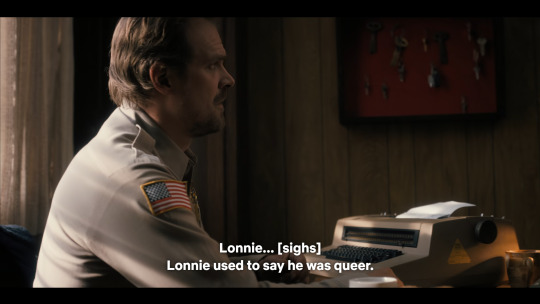
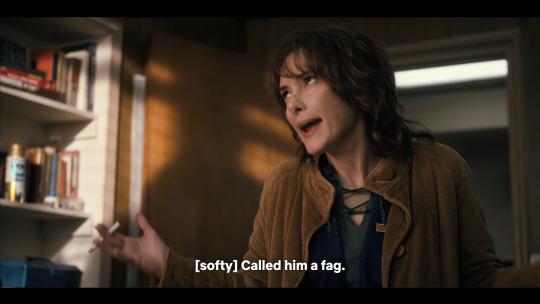
still thinking about this
tw ; talks about gun violence, racism and homophobia
I love everything our community has done and all the work that has gone into analysis, but you dont need a 300-something slide goodledoc to prove there's something going on here.
They talk about wills sexuality in the first episode, going so far as to use what is now a slur to describe him.
"oh but, lizbet, it was the 80s, it wasn't a slur then" I'm aware, but every film/show/book/play that is written in a different time period than the one it is set still has to be relevant to the audience it was made for. A lot of people think stranger things is set in the 80s to call back to classic thrillers like IT and ET, which it is...at its very basic, fundamental sketches. If that was all it is, the GA and younger watchers especially would not care for it as much as they do.
Anyone who ever read 'An Inspector Calls' in school should know what I mean. In 'An Inspector Calls', he author writes about the ignorance of an upper class 1912 family living in capitalist England through the context available to a 1947 audience. The audience knows the family faces two upcoming world wars, the titanic sinking and the great depression, this knowledge is used to highlight the ignorance of the family by believing England, and they too, are free from mistake or flaw. This dramatic irony screams out at you as you are watching/reading it. the typical audience doesn't scrutinise every detail, despite if those details are intentional.
"what makes stranger things relevant?" I hear you ask. "what context do we have that enhances the storytelling?"
Rising Russian-American tensions - Russians weren't actually shown as a threat in the show until season 3. Before then, it was pure paranoia from the US government in the show that fuelled their research and experiments, as the show is set during the cold war, it is relevant for the time period. The show reflects real life tensions as they've spiralled out of control due to the Russo-Ukrainian war through the actual introduction of Russian villains. (I think its common knowledge that the USSR were not actually opening interdimensional portals underneath 80s malls.)
The opening scene of season 4 showing the massacre of the lab children, children we'd seen innocently playing in the rainbow room. 010 we see taking a 'lesson' with Dr Brenner, the interaction is calm and the two joke. Moments later, every single one of those children is murdered. we hear sirens, screaming, and gunshots. The US in 2022 saw 51 school shootings. Gun laws in the US are a topic that a lot of people still do not want to address, but through stranger things, the writers force forward the reality of modern America in a way impossible to ignore. The reality that the leading cause of death in American children and teens is gun violence. The reality that an estimated 4.6 million american children live in a home where a gun is kept loaded and unlocked. The reality that, on average, 23 children are shot in the United States every single day. It's also the idea that it was the forced conformity of Henry Creel that pushed him towards this warped perception of humanity, allowing him to justify his actions. Reflecting the cases in which the shooter was a bullied student. Forced conformity being a core theme of the show, because it is relevant.
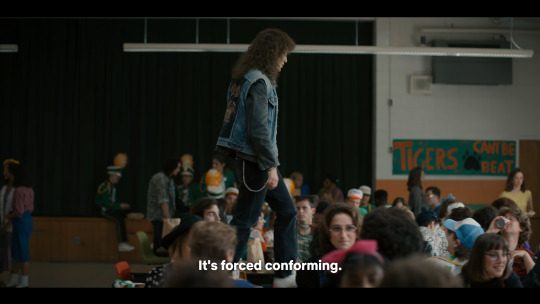
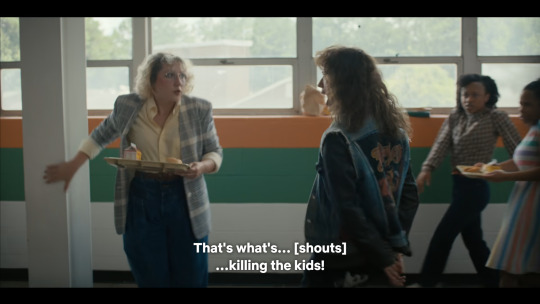
Constant reminders of a racial divide and aggression towards black characters, a theme that has persisted throughout the seasons much like it has persisted in real life.
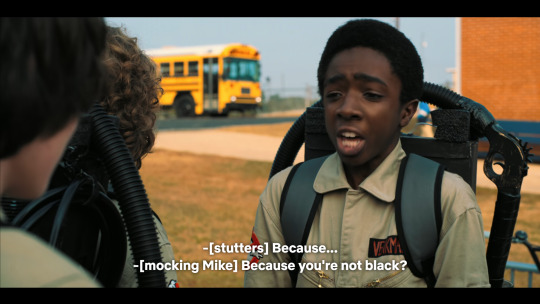
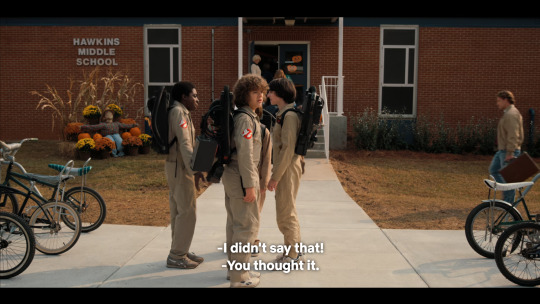
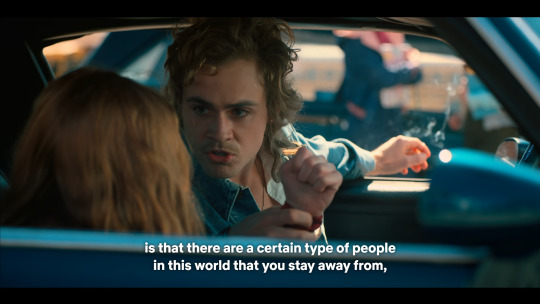
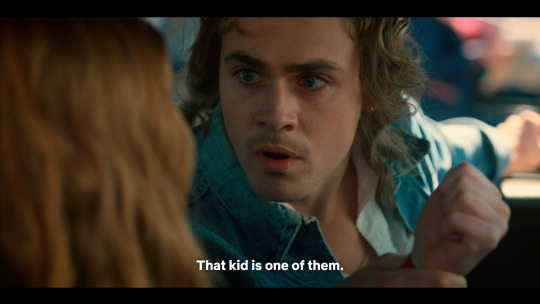
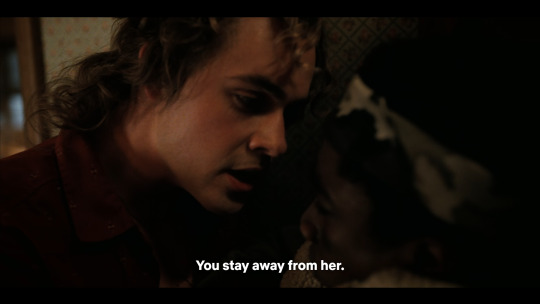
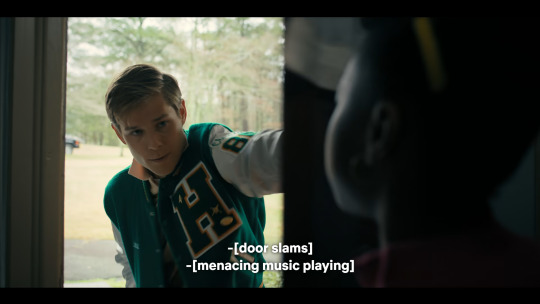
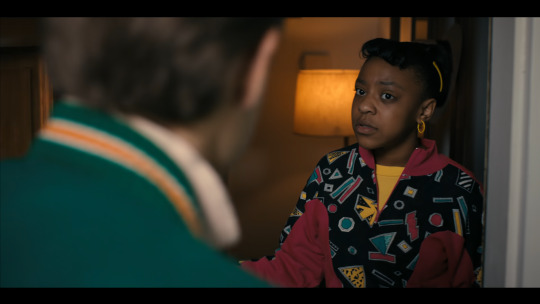
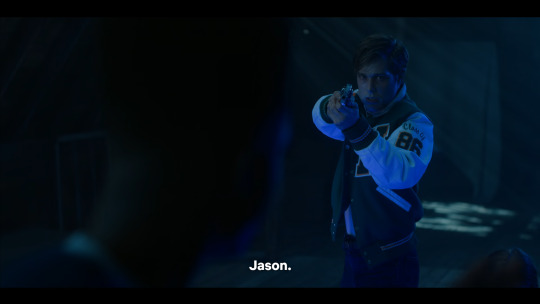
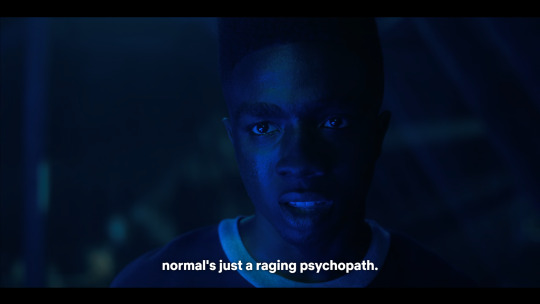
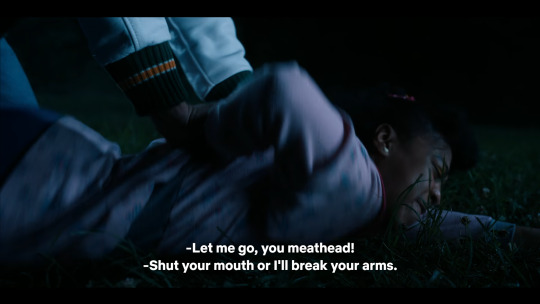
Growing LGBT acceptance
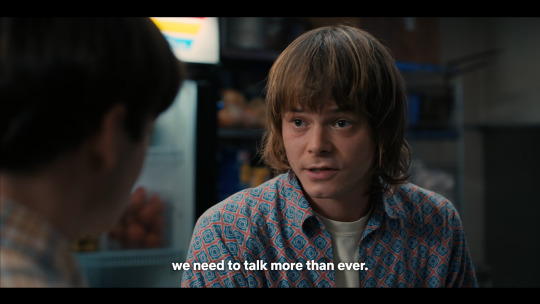
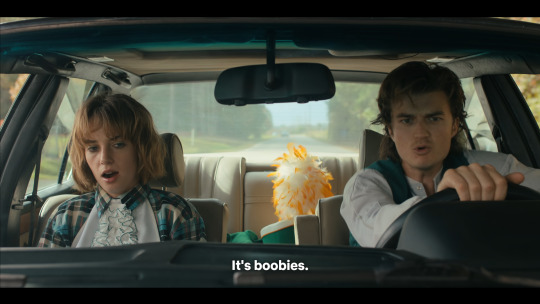
That's all I can come up with at the moment, I'm really eager to hear other peoples ideas on this, but moving on.
Each of these themes can be traced back to the very first episode.
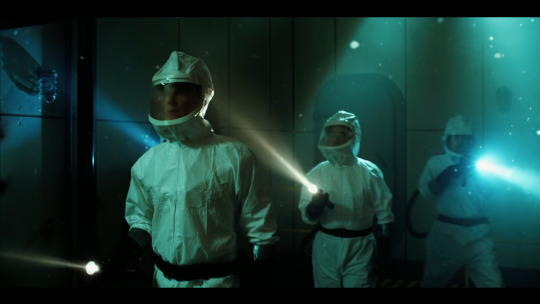
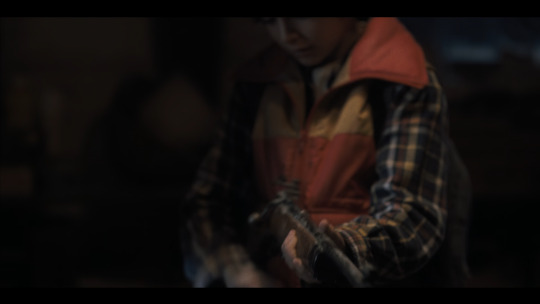
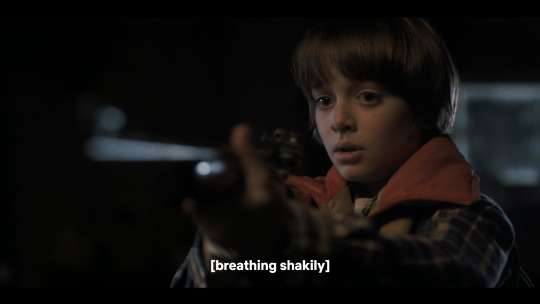
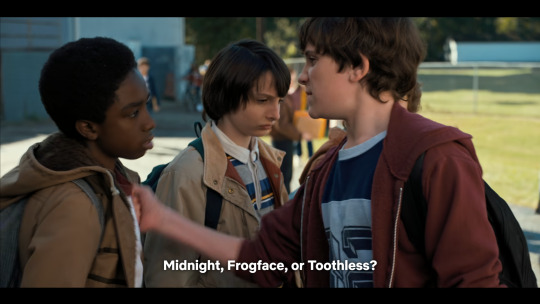
and then we have
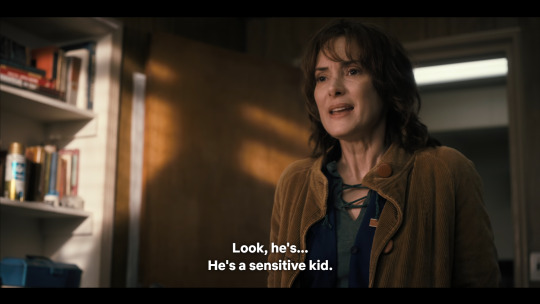


If you think this is far fetched, consider how you'd write the first episode of a multi-seasonal period piece to introduce ideas and themes relevant to your audiences.
Consider how the recent legalisation of same-sex marriage in the US would impact your choices.
For the purpose of portraying Will as a reserved kid for which it is unusual for him to not have come home, it would have had the same effect for Joyce to stop at the fact he is made fun of at school for his clothes and such.
this line adds a layer to her concern, that Will was targeted and hate-crimed, she is trying to get the police involved. What does Jim do?
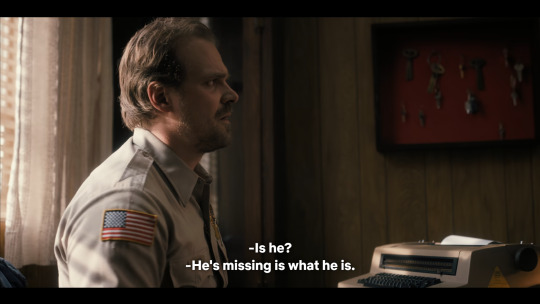
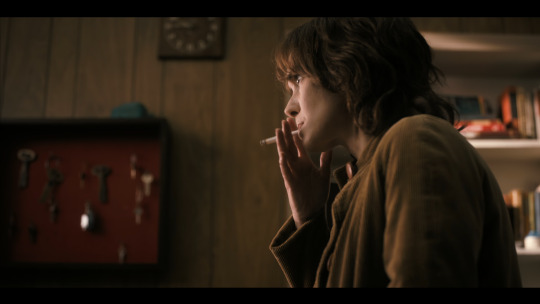
He expresses judgement.
There is no reason to include this other than to lay the groundwork for a theme that will come back later in the show.
A theme that did come back and slapped us all in the face.
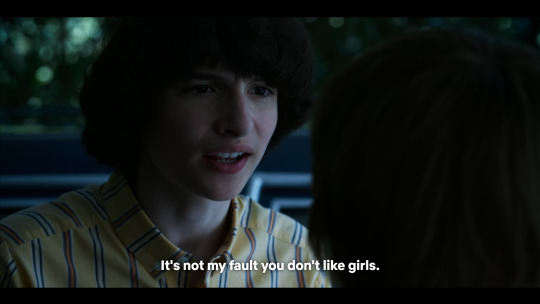
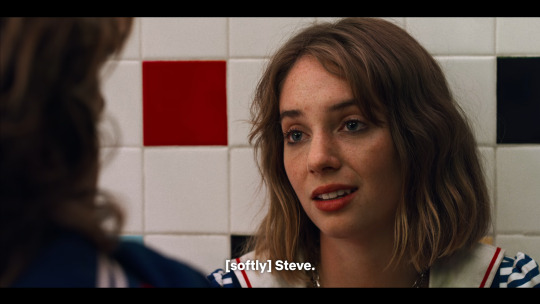
A theme that didn't go away like a lot of people wanted it to/assumed it would.
Assumed it would go away because so many shows nowadays drop a label or a flag pin on a character and leave it at that. It's frankly humiliating how people stoop so low to kiss the feet of writers who reduce them down to a few stripes. (most prominent example to me is Sasha Waybright's pitiful bi sticker in the last 3 minutes of the final episode that got people screaming in excitement.)
If this were the Russian-American tensions theme, it would be unusual to drop it before the shows concluding season, its core to Elevens storyline and the interactions of the main cast with ignorant government officials.
People have grown accustomed to the representation of queer characters with labels, that representation is the co-existance of hetero and homo characters without ever needing to address the differences. But we are different, its the beauty of being different that is ignored. I feel quite a lot of representation nowadays fails to reflect the core of LGBT experiences - love.
It is the love that makes us who we are, not the labels.
This is what makes Stranger things worthy of recognition, the queer characters are introduced through their love for others, not a single label is needed, they actually make a point of not labelling a single sexuality, which a lot of people mistook for them "dancing around the topic".
You think, for even a moment - with a style of queer storytelling such as that, that Wills love is going to be used to fuel the heteronormative relationship?
Stranger things - the show about being different, about love conquering hate - wouldn't go so far as to let Mike return that love?
yeah, right.
(i would like to add that these themes are serious issues i'm grateful the writers address. this post isn't meant to prove byler endgame, but the impact a requited love between them would bring to audiences and why that is important, much like the other themes.
the only way to have the full impact is for this theme to persist another season and play a crucial role to the shows conclusion, hence why Mike and Will are likely centre stage, even if they dont "get together", their bond is crucial to the plot, whatever happens with them and rovickie will be unforgettable.)
#mike wheeler#will byers#byler#byler parallels#stranger things 5#rambles#queer community#queer rep in media#queer representation
84 notes
·
View notes
Text
So I’ve had some Thoughts about From the DC Vault: Death in the Family: Robin Lives!
Warning: Spoilers
My mistake with From the DC Vault: Death in the Family: Robin Lives! was thinking that the story would actually be about Robin. That was on me. I should have known better, but I let my excitement of finally getting more Jason Todd, Robin content get away from me. I set up poor expectations, and it’s not the comic’s fault for not meeting those expectations.
Everything else is, though.
I know I’m biased, and I am probably writing this too soon after having finished Robin Lives to really give myself time to think critically about the story. But, I also feel rather offended by the end and feel the need to strike while the iron is hot. Recently, I talked about fans and writers needing to have respect for each other, as they can’t exist without each other. I also mentioned having a respect for the history of the comic. On that, I don’t get the feeling that J. M. DeMatteis has much respect for the history that was Jason’s Robin run. Granted, this isn’t mainline canon. It is more of a ‘What if?’ So DeMatteis wasn’t “entrusted” the same way but, there was still a line of basic respect that feels very lacking. Now, DeMatteis has been writing since the 80s and has written a lot for both DC and Marvel so he is a part of comic history, but this doesn’t really translate into respect for characters. Or for fans.
Both Jason and Dick’s character have a rough time in this 4 issue series. While the series called “Robin Lives” mostly focuses on Bruce and his regret, by doing that it makes Jason and Dick more like props for Bruce’s guilt than actually characters with their own agency. Bruce outright denies Dick’s choice in becoming a Robin and even later Nightwing. In this guilt, Bruce totally takes away the fact that even as a child, Dick did choose this, and he chose it again when he became Nightwing. So Bruce’s guilt serves no one here. And this problem gets worst with the Robin Lives ending. Dick becoming Batman, is an incredibly weak ending to start. Because most of Dick’s history is him growing out of Robin and then trying to break out of Bruce’s shadow. Yes, Battle for the Cowl happens, but it’s more complex than Dick just becoming Batman. And it’s easy to see how pointless all of Bruce’s guilt was when he decided to leave his role as Batman, only for Dick to take it up again. It really feels like Dick is only a prop for Bruce’s journey. Dick is here for Bruce to feel guilty about, but then to also relieve him of the duty that also makes him feel guilty.
And it is so much worse with Jason. This does sort of come back to me setting up poor expectations and the fact I thought this would be about Jason’s recover, but it was glossed over. We simply jump to Jason now being okay, which is a choice, if on the unbelievable side. What is worse, though, is how Bruce and the comic, makes Jason’s trauma about Bruce. Because yes, to an extent Bruce holds fault for the events leading up to Death in the Family. But he mainly holds fault in the form of negligence. He didn’t properly check out Sheila Haywood's background before for deciding she was a safe person to leave his son with. I am boiling down the issue of character interaction between Bruce and Jason (and outside influence that puts Jason’s last issues into context), but my point still stands that Bruce and Jason still made choices. For Jason’s part, he chose to trust Shelia to try, and save her. And in reality, Joker and Shelia hold the blame for Jason’s trauma. The fact Shelia was only briefly seen in a hallucination and “saving” Jason, again feels like DeMatteis has a lacking appreciation for the history of Jason’s Robin, and it’s context. Yes, Shelia saving Jason would be something Jason would want, but the event after this takes away everything that would make Jason still want Shelia’s affection in some way. With the ending and Jason becoming the Joker to Dick’s Batman, shows this. It ultimately feels like both Dick and Jason were used as stage props to re-establish some kind of status quo for a series that was only planned for only four issue. The run very well could have ended with the Joker’s death and everyone going to live happy lives but for some reason no.
Now, one could see that as DeMatteis having a respect for Batman’s history as a whole and a path for a continuation. I would argue, though, that it shouldn’t come at the cost of other character’s agency. The leap in Jason’s “madness” is awkward, and when I say leap I mean a massive leap. This goes back to my problem with the story not focusing on Jason. We spend so much time in Bruce’s grief that when it is about Jason, everything goes sideways and ends up with being a “What the hell did that happen?” Especially since in the context of the story, Jason should have gotten a lot more support from Bruce, now retired, from Dick, now living back in Gotham, and from Dr. Sarawarti Dev, a psychologist. Having Jason still become the Joker after all this, not only feels like all of those people continued to fail him (especially as Bruce and Dr. Sara get married, which was a strange addition), but that he never really had any choice. The story didn’t take the time to show us this, to show us how or where Jason became the Joker. He even denied becoming like the Joke in early issue 4. A point might be made that killing the Joker made Jason the new Joker, but a counterpoint Why? Jason already had the choice and decided? Why did he go back on that? Jason was Robin, Robin has the role of bringing hope, and being more compassionate, countering the fear Batman brings. We see Jason’s compassion before he died (or was injured in this case), when he still tried to save Shelia after she betrayed him. We see it in this comic with him still wanting her affection in his hallucination. So where did that compassion and care go?
The answer? It didn’t go anywhere. It was forgotten for the sake of a convoluted twist to make a reader gasp. Robin Lives spends its whole four issue run taking away the choice and agency of Robin. Robin does not live here. He becomes a puppet of the plot not to move outside of its designated story, he only can become Batman or the Joker. But never his own being. For anyone who’s ever enjoyed Robin, be it Dick Grayson, Jason Todd, Tim Drake, Stephanie Brown, Damian Wayne or any other Robin, past or future, Robin Lives is an insult.
#dc comics#From the DC Vault: Death in the Family: Robin Lives!#robin lives#J. M. DeMatteis#jason todd#Again is put through the wringer for other character's benefit#dick grayson#bruce wayne#I'm gonna go take a nap now man#Fun fact: I was pretty much done with something else but then this happened and i swaped gears
59 notes
·
View notes
Text
both 1) just straight-up amused that ASOIAF and WoT fans are still starting internet fights twenty-five years down the line (this feud has legs) and 2) thinking about how it's actually in some ways not very interesting or useful to compare them as works because ASOIAF is in the act of being created still - yes yes probably the main series will never be finished, all the backstory stuff still counts - and WoT was completed over a decade ago.
by which I mean, WoT was written in response to '80s and '90s fantasy tropes and is best understood in that context, and ASOIAF and adjacent works started out in that context but have outlived it as a continuous act of creation right up until the present day. they're talking different languages now. even the WoT TV show, which is being currently created, is a re-imagining of a now-older completed work rather than part of an ongoing one. it's just such a different vibe and conversation.
#wheel of time#the authors liked each other's work IDK why parts of fandom are still so weird about it
72 notes
·
View notes
Text
When it comes to HMC trilogy, I take almost no criticism, as it just a wonderful written-story with alive and relatable characters. However, If I had to name a part I'd found reasonable to criticise and may critises myself, I'd say it's Lettie Hatter's arc.
Not because it was entirely bad, but because it could be so much better If it wasn't written in the 80s and had a different mindset attached to it. And because the way it starts and the way it progress has little to no connection to how it ends.
Because the whole thing of the Hatter sisters, all of them, was breaking social norms and expectations.
Sophie firmly believed that she would stay in the Hatter Shop for the rest of her life with the most boring existence possible — and yet she married the most chaotic, whiny and slither-outing wizard in all of Ingary, with whom everyday is a full-blown fantasy adventure.
Martha, as the youngest, was expected to have the above mentioned fantasy adventures, be a mighty witch, even a hero, maybe — but she decided to chose a happy, steady basic life with a husband and ten kids, and she didn't want to listen to anyone who said otherwise.
Lettie's arc, just as the whole stories of her sisters, were tied on what people wanted from her. She was the most beautiful out of all girls, If we believe Sophie's words, and people almost wished she would marry and find a life spouse, as she had one million proposals a day even before switching with Martha. But that wasn't what she wanted — I'm sure she would reject all of them as often as her sister did, because she wasn't a big fan of it, just as working in the bakery. Lettie wanted to be a witch, and she practically became one, switching with Martha, working with ms. Fairfax.
But while Sophie's arc of expecting to be plane and ordinary ended on being gifted and adventurous, Martha's arc of avoiding busy life ended on finding a person she loves and planning to build a big family, Lettie's arc of searching for greatest achievement and avoiding marriages ended on...a marriage.
A marriage that, as stated by herself — "Ben doesn't like people to know I'm a witch" — kinda disregards her initial want to show that she has intelligence outside of her beauty, the one that he can show and that she can use.

(This line has absolutely no context whatsoever and we can only guess why Ben wants so, because it's actually so out of his character, even all the bits that were described before. But nope, no context, no explanations. It may be because she was pregnant at the time, but, again nothing like this was ever said and it's a pretty lame excuse anyway. Magical mirrors in their house also do not obey Lettie, at all)
And, as much as I absolutely love Ben and as much as I absolutely love Lettie, I don't think pairing them was a good choice. Mostly because Lettie was seventeen (one year younger than Sophie) in the end of HMC when their "pairing" started, and Ben is described to be noticeably older that Howl in CITA, which brings us to the conclusion he's at least in his thirties. And that's...a bit uncomfortable of an age gap, especially If we take into the account they canonically had a kid about a year later. And also Ben was supposed to be her mentor.
...And If he stayed her mentor and nothing more, it would be actually great. Because I believe Lettie deserves the same development her sister had, to get was she initially wanted and what she was fighting for. To be an apprentice of the Royal Wizard, to be a powerful a well-known witch, to show the world who told her that she has to marry to succeed in life that she in fact, doesn't, to show all this guys that tried to propose to her that she didn't need them, at all. But definitely not a wife, or a mother.
Not because being a mother or/and a wife is a bad character development. It worked perfectly with Sophie, because it represents her chaotic happily ever after better than anything else, it worked with Martha because she wanted to had ten kids and marry. It's just not for Lettie's character in particular precisely because everything in her concept of "beatiful middle sister" showed that was she's supposed to be.
Because Mrs. Pentstemmon said Lettie awaits a great, good fate, that she'll be as powerful as the Witch of the Waste — and I want to see it. Because I didn't.
#hmc book#howl's moving castle book#hmc#howl's moving castle#sophie hatter#lettie hatter#martha hatter#ben sullivan#she also didn't perform magic at all except for helping an APPRENTICE with some basic spells#her lever is such above it god#howls moving castle#analysis#character analysis#DWJ I love you sm why you didn't like my queen Lettie enough
75 notes
·
View notes
Text
Book Omens!
It’s finally happened. After reading him Lord of the Rings, Harry Potter, Chronicles of Narnia, Series of Unfortunate Events and most recently The Princess Bride, I have finally decided to read Good Omens to my son (for context, he’s 10).
If you’re wondering how far we’ve gotten in, we have reached the chapter Wednesday.
I’ve read it numerous times myself but the last time was years ago and it’s both wonderful and weird to read it again.
Things of note:
- it’s hilarious trying to explain stuff that was common in the 80’s and 90’s that my son has no context for (such as “Why is there a phone in the car?! You’re not allowed to talk whilst driving!”, or “What’s a cassette?”, or “What’s a punch card and why do you put it in a computer?”, and “what the heck is a fax machine?!”)
- there are a lot of jokes and references that are pretty much lost to time. Also clearly references to notable British personalities of the time that are no longer important.
- Aziraphale refers to Crowley as “My dear”, “my dear boy” and “dear boy” in quick succession whilst they’re drunk talking after the delivery of the antichrist. Why didn’t we have that more in the show?! (Manifesting season 3)
- it’s very obvious which parts were written by Pratchett and which parts were written by the other to be nameless author. (Terry 100% wrote all the footnotes)
- I completely forgot that the conversation between Crowley and Aziraphale in the Edinburgh minisode in season 2 is lifted almost directly from the book (image below). That was a bit of a surprise.

- it’s canon that angelic and occult beings go to the bathroom, as according to the footnote below (about Crowley sleeping through the majority of the 19th century), and I’m surprised this isn’t spoken about more. So fanfic writers, you can use this without argument now 😜

As far how my son is enjoying it, he likes it, and thinks it’s a bit ridiculous. I did have to tell him the ending ahead of time, that the Apocalypse is averted. Due to his autism he gets very anxious and he didn’t like the idea of Armageddon (it was the drunken conversation about everything ending that caused him some anxiety). So this way he can enjoy the book in the knowledge it turns out ok in the end.
I’ll continue to give updates as we go.
#good omens#book omens#crowley#aziraphale#ineffable husbands#aziracrow#crowley x arizaphale#good omens fandom#reading good omens#terry pratchett
68 notes
·
View notes
Text
Hi sorry I can’t stop thinking about how Charles grew up in -the AIDS crisis- and how that affected him and his view of sexuality. I initially thought ‘well he’s bisexual, obviously, he’s gotta know that’ but I really don’t think he does!!
My partner and I kept going ‘well what happened in the last 30 years?? Why didn’t they figure this out sooner?’ And I take that back. Those 30 years were the rest of the ‘80s, ‘90s and ‘00s, shit was -not- better for being queer. Like you might not have been burned at the stake, but people finding out could still ruin your life -very- easily. Discrimination laws were shit, they still kind of are in a good amount of states. I don’t know anything about discrimination laws in England at the time but they can’t have been better.
So I think Charles had clocked Edwin as queer very early on and was like ‘I’m not going to be like my father, or my ex-friends, I’m going to accept my friend’. And gave no thought to his own sexuality, most likely as an unconscious protection. (I’m fine with other people being gay, but -I- can’t be gay type of thing)
Also Punk subculture in England began in the ‘70s and obviously went into the ‘80s going very strong. Charles being from a lower-income family (still high enough income to send him to boarding school and having a basement, but we also have to consider that the ‘80s economy was -much- different and people could still afford a house and be poor at the same time) and dressing and speaking the way he does pinpoints him to a specific section of London that was seen as less desirable and punk culture and queer culture and poor culture -were and still are- a big-ass Venn diagram.
(Side note, Maurice by E.M. Forster was written in Edwin’s timeline. It’s about class disparity, being queer in an English boarding school and having a genuinely happy ending and it wasn’t published until -1971- because Forster did not want it published while he was still alive for obvious reasons)
(Other side note, Edwin was born just 5 years after the Oscar Wilde trials, so you -know- that scandal was burned into his brain from a young age)
But Charles knows that he loves Edwin in all other aspects, and I’d like to think that he’s recently come more to terms with his sexuality as a result of watching of the culture shift before his very eyes. Not thinking about it explicitly in the context of Edwin but like, understanding that queerness isn’t bad and -really- internalizing that.
We also don’t know if Charles has ever been in love before, and Edwin has had three -recent- experiences that have pushed him to this realization. Monty, the Cat King and Niko showing him her BL collection. Charles most recently was involved with a girl and he did -not- have several rendezvous with self-revelation. I think his response in Hell was extremely well-measured, all that considered. I just love this character and I have a lot of thoughts.
#disclaimer I’m not a historian I just have a lot of passion for historical context and queer history is -important-#the dead boy detectives#dead boy detectives#dead boy detectives Netflix#charles rowland#Edwin Payne#steve yockey#personal
137 notes
·
View notes
Note
In the books, Sirius's devotion to Harry is of course very deep, but it never translates to something physical. He only shakes Harry's end when he leaves his bedside in book 4, and in book 5 there is something resembling a hug, like twice...? As a dog he stood up his hind legs and front paws on harry's shoulders and a half hug after Christmas. Idk it sort of drives me crazy, because in the movies Harry and Sirius are so affectionate! That first hug when Harry arrives in Grimmauld!! Gary and Dan had an amazing chemistry that other actors were jealous of, they mirrored the book characters, so it palpable on screen, the few scenes Gary is in at all at least.
So, what do you make of this? Do you in musing for art imagine a more affectionate relationship between Harry and Sirius? Maybe if Sirius survived the war? Molly's hug in book 4 was a poignant moment but imo that should have been a moment between Sirius and Harry. Sirius already says he expected something catastrophic to happen to Harry in the third task, that's what he stutters when Harry comes in with Dumblebore. So he is literally afraid of his godsons life and it still shows of course, Sirius staying at Harry's side was very beautifully written, like the devotion is clear, but I am foaming at the mouth for more affection between them in canon? Platonic, not shipping. So between the movies and the books Im just kinda torn what's better
It's more a rant than an ask, sorry lol, but if you have any input I'd he so stoked to read it. Not many peeps in the fandom even give Sirius and Harry any time of day, nvrmind even understand what they had (which also drives me kinda nuts but ok)
Ohhhh, anon, you’ve come to the right spot! Mostly because I love them. I would say that 80% of my fandom interest is just Sirius being a dad to Harry.
To your question, I don’t think one is better than the other. Each has their purpose. Let me share my thoughts:
1. I am soft for movie Sirius and Harry’s affectionate touching. However. The dynamics of their relationship were NOT mirrored from the books, which…is fine. Honestly, I just don’t think it was a priority for the filmmakers. This particular bit doesn’t bother me because the movies are not supposed to replace the source material—they are an interpretation. To me, watching the movies is like reading fic—fun to watch but not canon. Also, the filmmakers removed so much of their relationship in GoF that they HAD to make Sirius and Harry physically affectionate in order for movie audiences to see what losing Sirius would mean to Harry. Their complexity is completely unexplored in the films, and they had to do SOMETHING to get the audience to feel sad when Sirius died. This started in PoA when they really downplayed the context of their relationship. (Lol, see my rant on PoA. I really don’t like that movie hahahahaha.)
2. In the books, Harry and Sirius are not physically affectionate with each other despite their intense love for each other, and I think this is an effective way to show characterization. As I tell my students, this might have been intentional by the author, but it could have been an instinct that she followed (what feels right for the characters).
Here’s what I think: both are so terrified of losing the other that they won’t allow themselves to get too close, and, crucially, they both fear showing vulnerability. Touching someone and reaching out for a hug or comfort is an extremely vulnerable thing to do. If you reach out for a hug, you are showing your true feelings. To be rejected physically is sometimes more devastating than someone telling you to just “go away.” It’s a sign of trust to touch someone—you are trusting that they feel the same way about you, and you are trusting that they won’t pull away. Both Sirius and Harry understand rejection, and both avoid it. How do you avoid rejection? You distance yourself.
I’ll put the rest under a cut because I think this might get long…
Sirius and Harry, for all that they love each other, fall out of trusting each other by OotP. Part of this is trauma, but it is also miscommunication. Harry is worried that Sirius will do something stupid—either out of concern for Harry or because he wants to get out of number 12–but he’s worried he’ll lose Sirius. So by withholding affection (which I’m not sure if he knows how to give physically), Harry distances himself from Sirius which will, theoretically, keep Sirius safe (of course, it backfires). Sirius is…you know…going through stuff in OotP. He is already vulnerable—he perceives himself as being emasculated because he’s not allowed to leave his childhood home and he’s relegated to performing ‘uninteresting, domestic work’, and he must be inactive when he’s a man OF action.
When it comes to Goblet of Fire and the odd handshake… I think Sirius is reeeeeally holding back. Harry does NOT want him to go, and Sirius knows this. (Why DOES Dumbledore send him away? Literally anyone else could have “alerted the old crowd” and NOT the convicted murderer. This is clearly the author’s excuse to get Sirius away from Harry—and, I’ve spoken to this before, Sirius is too much of a miracle character—too smart, too loyal, too loving to support the story that the author wanted to tell.) Sirius, if he had stayed, would have been the emotional support that Harry needed. So if Sirius holds Harry, what if Harry doesn’t let go? What if Sirius himself can’t let go? A handshake will have to do.
So Sirius leaves Harry with that bizarre handshake. That Sirius leaves at all damages their relationship—it could have been repaired with time (if they’d been allowed time), but this moment makes Harry realize that he cannot rely on anyone, not even Sirius. This leaves Harry to be isolated in OotP, and it leaves him to feel like he cannot trust anyone. I’m not blaming Sirius for leaving, but I believe this action causes a rift between them that carries into the next book.
My point is, I HATE that they don’t touch but it is very important that they don’t, at least when it comes to the story that the author wanted to tell. I think it was the right move when we look at the story as a whole. Do I like it? NO! But it’s interesting, and it DOES feel right for them. Is it devastating? Yes!!!!!!!
TL;DR: I don’t think either interpretation is necessarily better than the other, but they both have their purpose. Both are effective!
Touch is…huge in HP. Consider Voldemort’s “I can touch him now” and causing Harry pain. Touch is a privilege, and to be touched without permission is a violation. Harry kills someone by touching them. He is only touched by his family when Dudley beats him up or he gets shoved in his cupboard.
Weirdly, one of my absolutely favorite moments when Sirius and Harry touch is in PoA when the Dementors are closing in on Sirius, Harry, and Hermione, and Harry, as he’s about to faint, reaches out to grab an unconscious Sirius by the arm, thinking something along the lines of “the dementors weren’t going to take him” and such. And this is about two seconds after Harry has accepted that Sirius is telling the truth! Harry physically tethers Sirius to him—this touch-starved teen reaches out to this man who is now everything to him, who is now his only real family, willing to risk death (or worse) to keep it. BUT THEY JUST MET!!!!! Devastating!!!
Also…another thought: the first time Sirius and Harry touch is the first time Sirius has been touched as a human in twelve years. And Harry is beating the absolute shit out of him…and then Sirius nearly strangles him…
Also, also, not to like…self-promote, but if you want some Sirius & Harry family feelings and a wee bit of affectionate touching, I wrote a one-shot where they talk about their feelings in OotP.
Anyway, this got longer than I thought. Thank you for the prompt!!
#if this sounds critical of sirius it’s not#he is a Very Good Character#if he were ‘perfect’ he’d be boring#i like his messy parts#and i like harry’s#i wish there had been more of them together#but i like that we can build the relationship outside of what we’re given#i love AUs#sirius black#harry potter#hp meta#long post#asks
103 notes
·
View notes
Text
I am a huge Dan Howell fan. Really just a huge Phannie in general. Have been for at least 8 or 9 years. So, naturally, when Dan came out with “We’re All Doomed” I bought tickets to the first online showing. With the Dan Q&A after and everything. Not a brag at all, but just to give context.
The first time I saw it, I laughed so hard, I could feel myself become faint. By the end, I was sobbing. And I was just wishing I could buy it in DVD or something.
Today, for the first time since it was released, I rewatched “We’re All Doomed” on YouTube.
I have, “Embrace the void and have the courage to exist.” Written on the side of my converse. I am a dork and a half about these two.
I have the potential to live to my 80s or die before I’m 21 because of my cancer. And that can be extremely discouraging some days when I know I need to do things and be a human. Because, If I’m likely to die so young, why do anything at all?
But Dan said something that we all need to hear when we feel like that- for any reason.
“We may all be doomed. Death may be inevitable. But first, we get to live.”
I often forget that before I die, I get to live.
There are things worth fighting for and worth living for. Relationships, education, careers, or really even just the planet itself. Life is a miraculous thing and we are surrounded by it.
Life is worth living. Every single day is worth embracing and enjoying to the fullest. Some days you can’t get out of bed, and you can still enjoy that day to the fullest.
Being sick can make it hard to live before you die. But everyday is worth embracing for what it is.
I doubt Dan will ever see this, but if he ever did, somehow, miraculously, I would want to say:
Thank you, Dan, for reminding us of these things. And thank you for making my childhood as bearable as it was- even through my first bought of cancer treatment. I, at 14, would rewatch your old videos and watch the Undertale play through just to remember that friendships are worth staying alive for and that there is a light at the end of the tunnel if I only kept trying. So, yeah. Thanks for reminding me that life is worth living, even when you yourself felt it maybe wasn’t.
Forever a phannie, finding the courage to exist,
Howl
#thoughts#cancer#we’re all doomed#dan howell#dan and phil#I know it’s stupid to put a message to Dan in here but please understand that I know that 💀🥲#death is an old friend of mine#“death may be inevitable but first we get to live”#queer#Dan also coming out as queer and never agreeing to use a concrete definition of his sexuality helped me so much when I was coming out#because I always felt like I had to have a label but him not using one that was so strict was so groundbreaking for me#Dan is a terrible influence#that’s a joke#i love dan and phil#dan and phil games
22 notes
·
View notes